
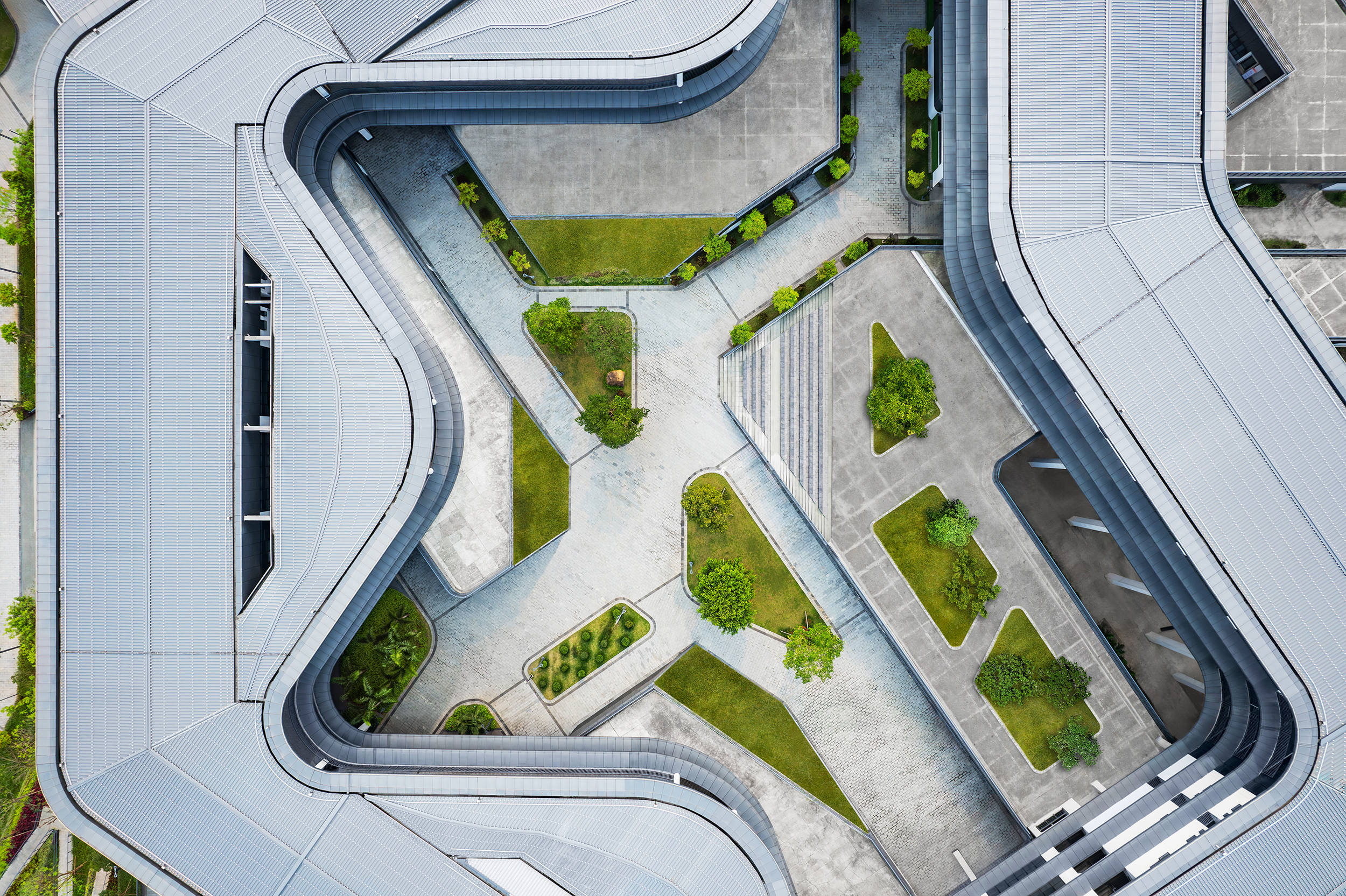
设计单位 Crossboundaries
合作单位 DGN Design Studio, 海南华磊建筑设计咨询有限公司
项目地点 海南海口
建成时间 2024年1月
项目面积 138,095平方米
本文文字由设计单位提供。
AI时代与现代教育
The AI Era and Modern Education
随着我们进一步迈入AI时代,像ChatGPT这样的技术已经成为我们日常生活的一部分,教育也在以惊人的方式演变。
As we move further into the AI era, where technologies like ChatGPT are becoming part of our everyday lives, education is evolving in remarkable ways.
▲ 项目视频 ©Crossboundaries
占地13万平方米,可容纳3600学生的北京大学附属中学海口学校,其设计正是这种演变的体现,从传统的教育模式转向更加灵活、个性化和技术增强的环境。在AI技术的推动下,学校设计强调培养学生的创造力、解决问题的能力和团队合作精神,确保学生全面发展。
The design of the Haikou Campus of the Peking University Affiliated High School is a reflection of this evolution, shifting from traditional education models toward a more adaptable, personalized, and technology-enhanced environment. With AI technology shaping learning content and methods, the campus design places a strong emphasis on fostering creativity, problem-solving skills, and teamwork in students, ensuring their comprehensive development.
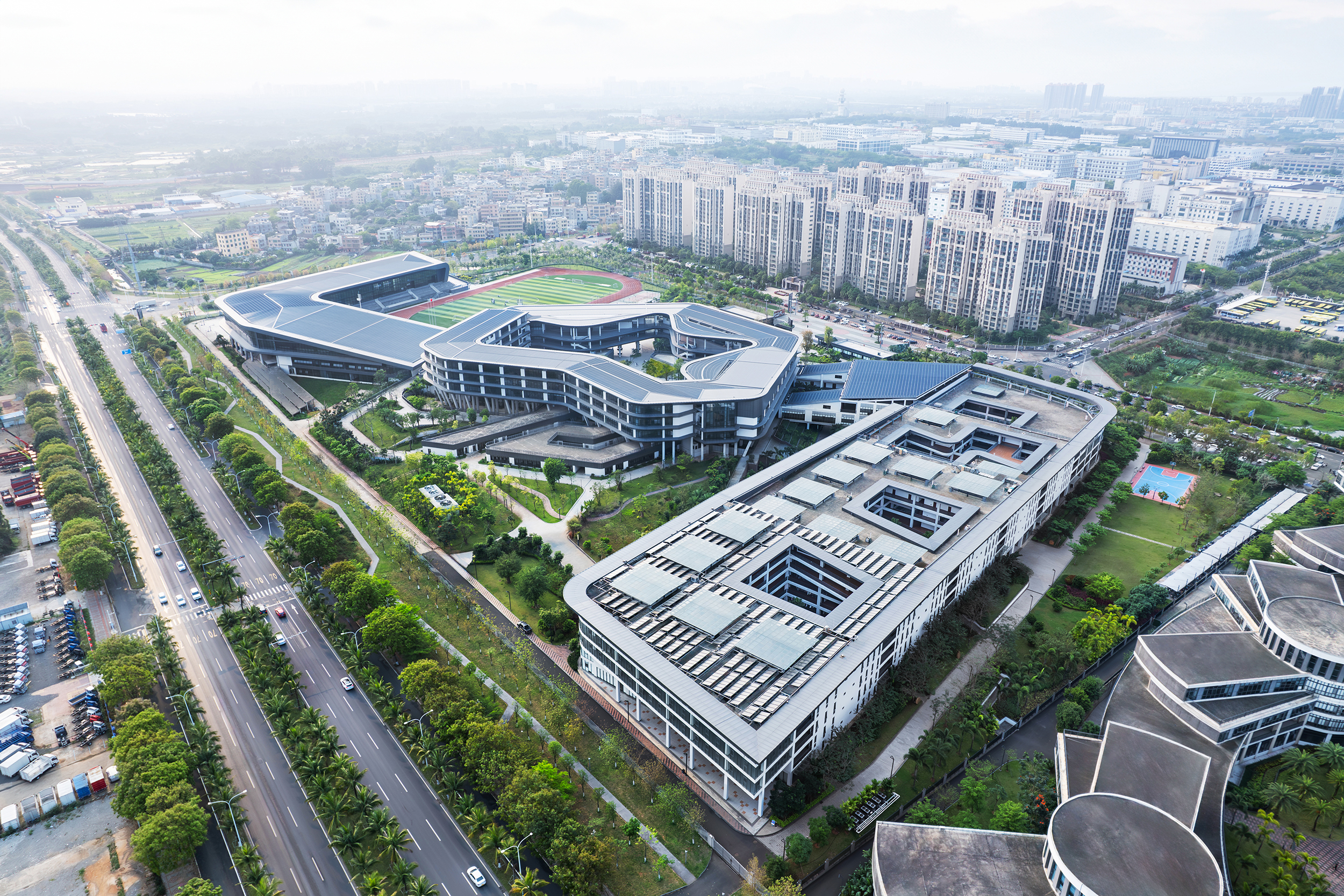
海南:教育创新的枢纽
Hainan: A Hub for Educational Innovation
海南省因其迷人的热带气候和美丽的岛屿风光而闻名,如今它也成为了教育创新的灯塔。作为国家教育发展与创新试验区,海南得到了教育部的大力支持,成为促进中西部地区教育发展的计划之一。
With the rapid development of the education environment, Hainan Province, known for its stunning tropical climate and picturesque island scenery, has also become a beacon of educational innovation. Recognized as a national education development and innovation pilot zone, Hainan receives strong support from the Ministry of Education as part of its plan to boost educational growth in central and western China.
北京大学附属中学海口学校占地超过200亩,总建筑面积约为13万平方米。一旦全面投入使用,这个宽广的校园将为约3600名六个年级的学生提供服务,其中包括1500名初中生和约2100名高中生。学校致力于培养学生的创新精神和实践技能,使他们能够应对快速变化的社会挑战。
The Peking University Affiliated High School, located in a district undergoing rapid renovations and developments, is exemplary to this education reform in Haikou. The site of the project spans over 33 acres, with a total construction area of approximately 130,000 square meters. Once fully operational, this expansive campus will serve around 3,600 students across six grades, including up to 1,500 middle school students and about 2,100 high school students. The school is dedicated to fostering an innovative spirit and practical skills in its students, preparing them for the challenges of a rapidly changing society.
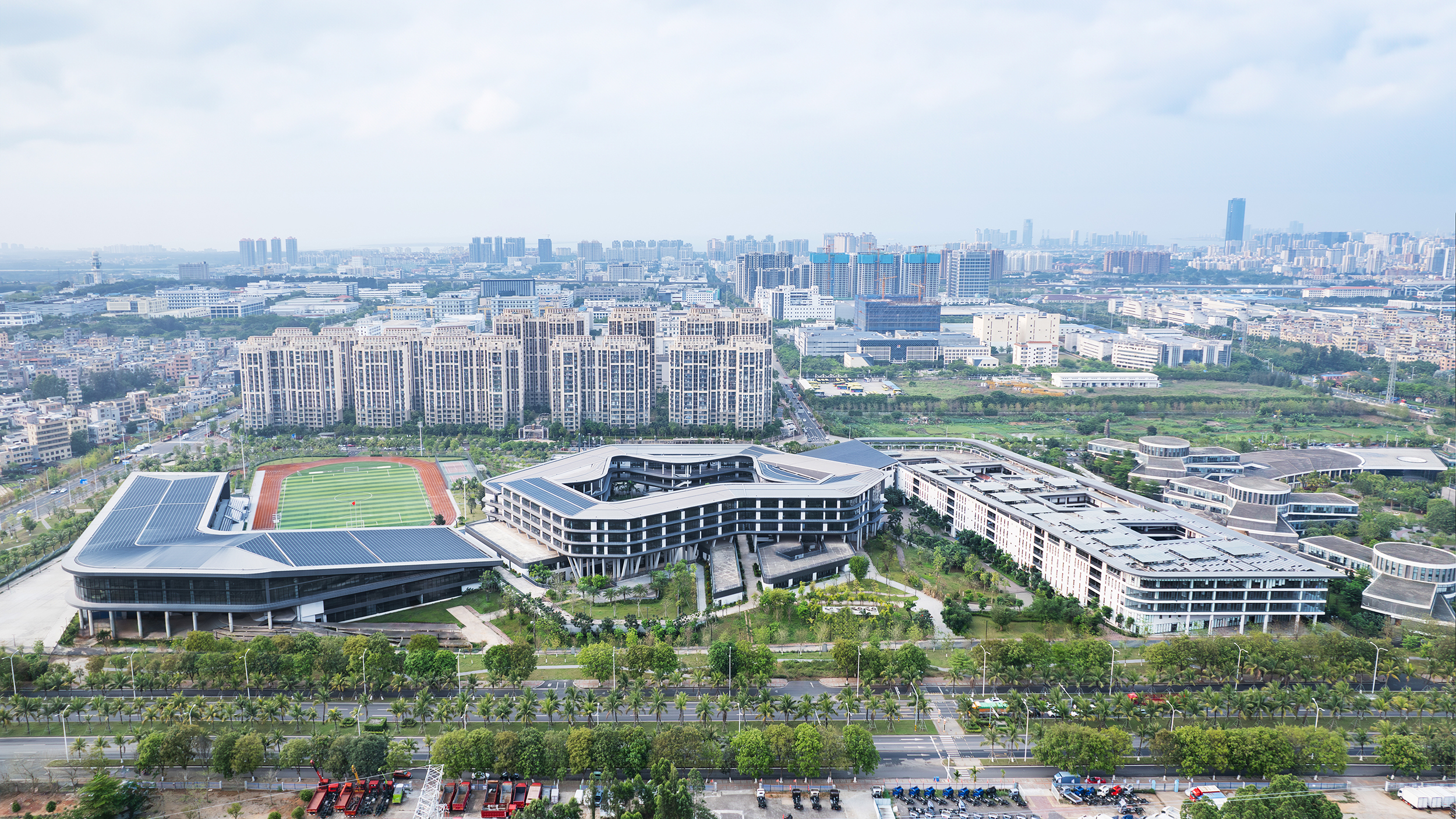
独特的校园设计
An Unconventional Campus Design
Crossboundaries团队在设计上打破了传统的校园布局,创造了一个独特的、曲线形的“S”型建筑,其核心是有机形态的、升高的“云”学习中心。这一创新设计解决了场地的地形挑战,特别是南、北两端显著的高度差异。“S”型不仅是一个视觉元素,也是对风向、阳光和阴影方向的实际响应。建筑的纤细轮廓确保了有效的交叉通风,而较低的高度则将地形上的长投影最小化。在有利的地方最大限度地利用自然光,在其他地方则进行精心控制。
Stepping away from traditional campus layouts, Crossboundaries has created a distinctive, curved S-shaped building with an organically shaped, elevated 'Cloud' learning center at its core. This innovative design addresses the topographical challenges of the site, particularly the significant height differences between the North and South ends. The S-shape is not only a visual element but also a practical response to wind direction and the orientation of sunlight and shadows. The building’s slim profile ensures effective cross-ventilation, while its low height minimizes the casting of long shadows on the terrain. Natural light is maximized where beneficial and carefully controlled in other areas.


位于校园中央的 “云”学习中心,似乎漂浮在图书馆和其他公共空间之上。它是师生互动的主要枢纽,容纳了初中部和高中部的教室。围绕“云”的建筑按地形排列,提供了多样的“微环境”,其中包括创客空间、艺术中心、体育设施和宿舍综合体。
The cloud-shaped learning center, centrally located on the campus, appears to float above the library and other public spaces. It serves as the main hub for interaction between teachers and students, housing classrooms for both the middle school and high school departments. Flanking the cloud, the building strip is arranged according to the natural contours of the terrain, providing a variety of 'micro-environments' that include a maker space, art center, sports facilities, and a dormitory complex.

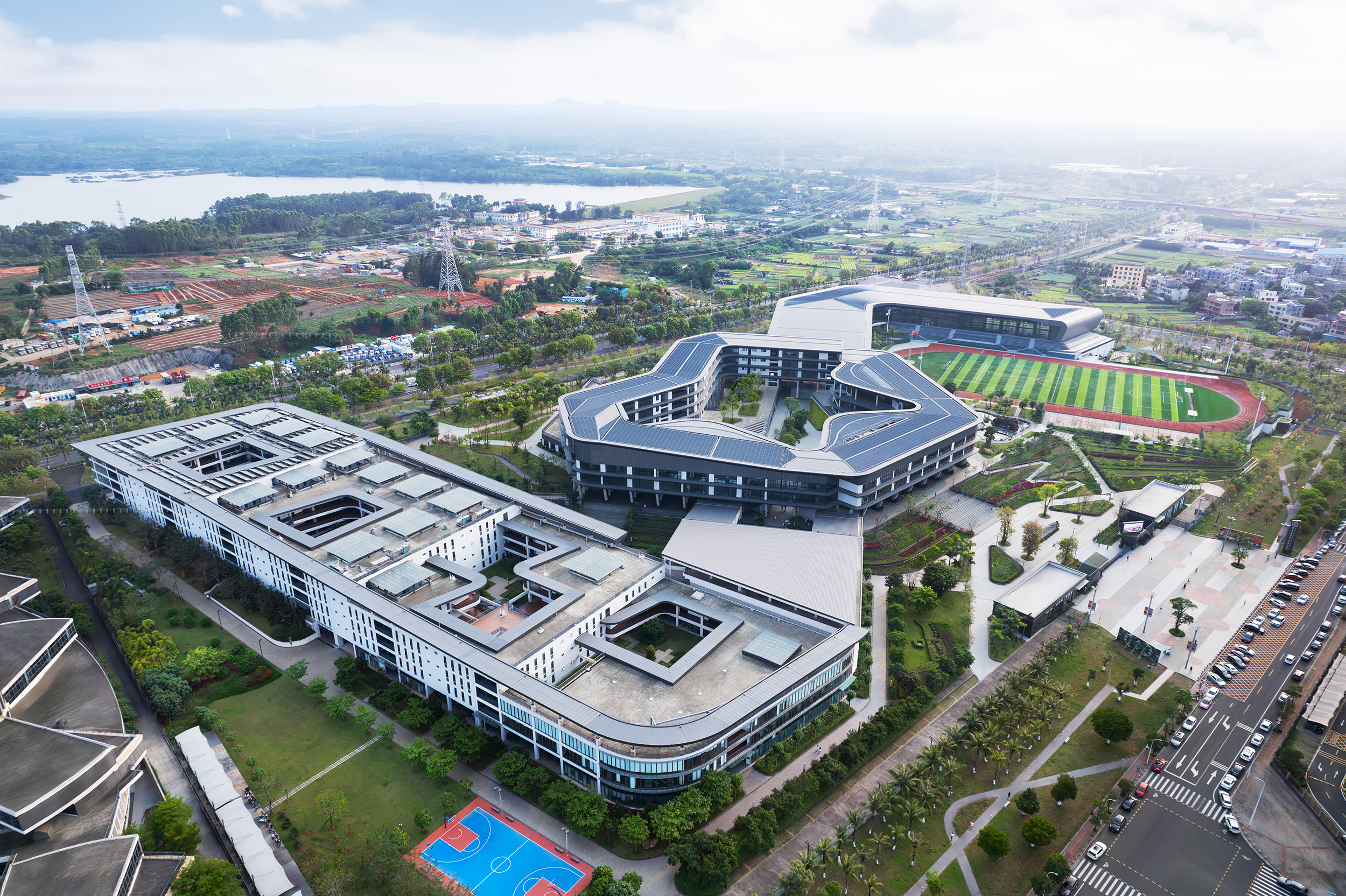
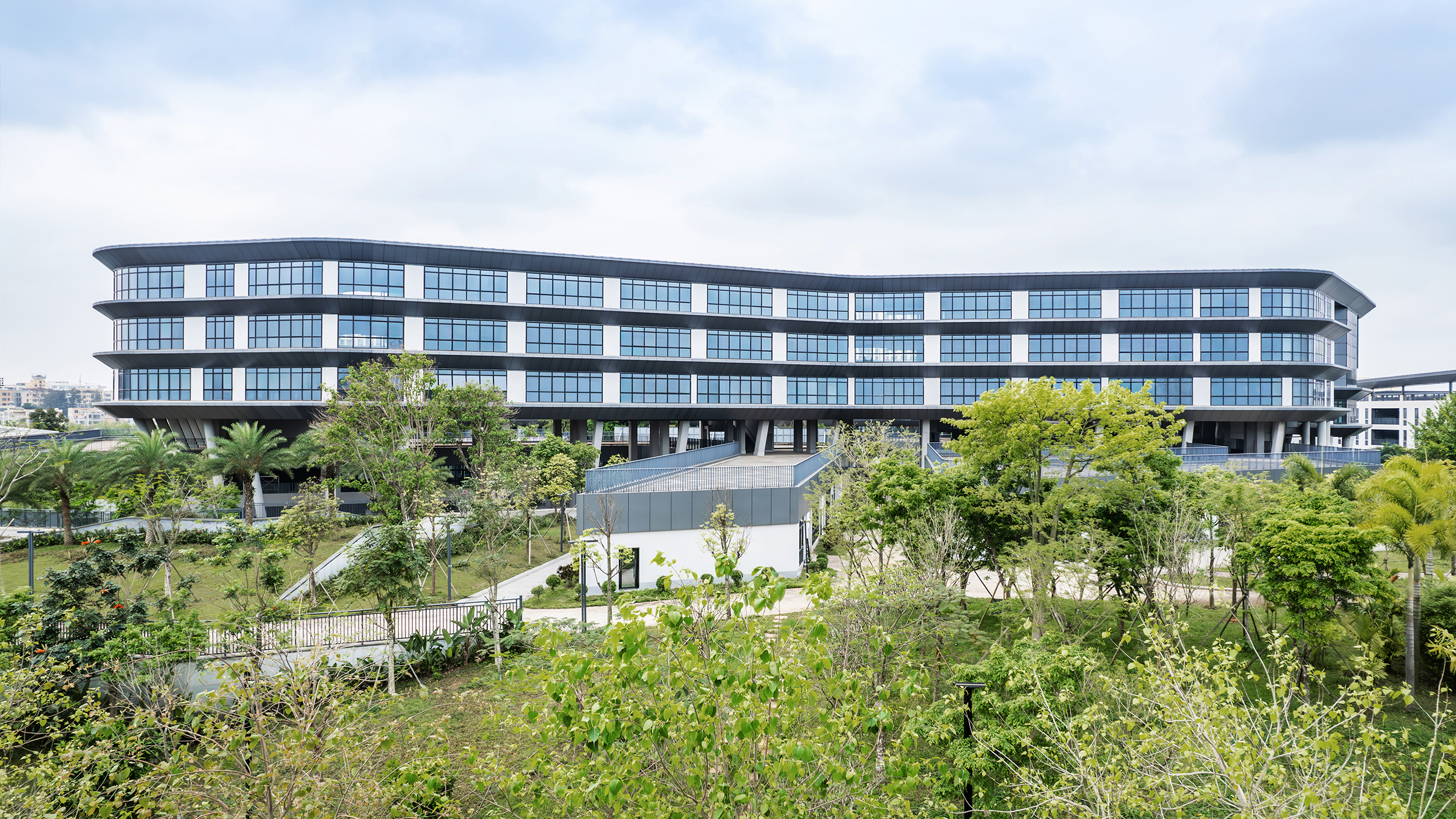
与自然和谐共生
Harmonizing with Nature
校园整体设计秉持对自然的尊重,融合了热带建筑概念,考虑了遮阳、空气流通、通风、建筑朝向和开口等因素。校园还融入了绿色设计策略和技术,如太阳能和再生水系统,以有效减少能耗,特别是在冷却方面。
The overall design of the campus is guided by a deep respect for nature through the incorporation of tropical architectural concepts. These concepts consider factors such as sun shading, air circulation, ventilation, building orientation, and openings. The campus also integrates green design strategies and technologies in the form of solar energy and reclaimed water systems, to effectively reduce energy consumption, especially for cooling.
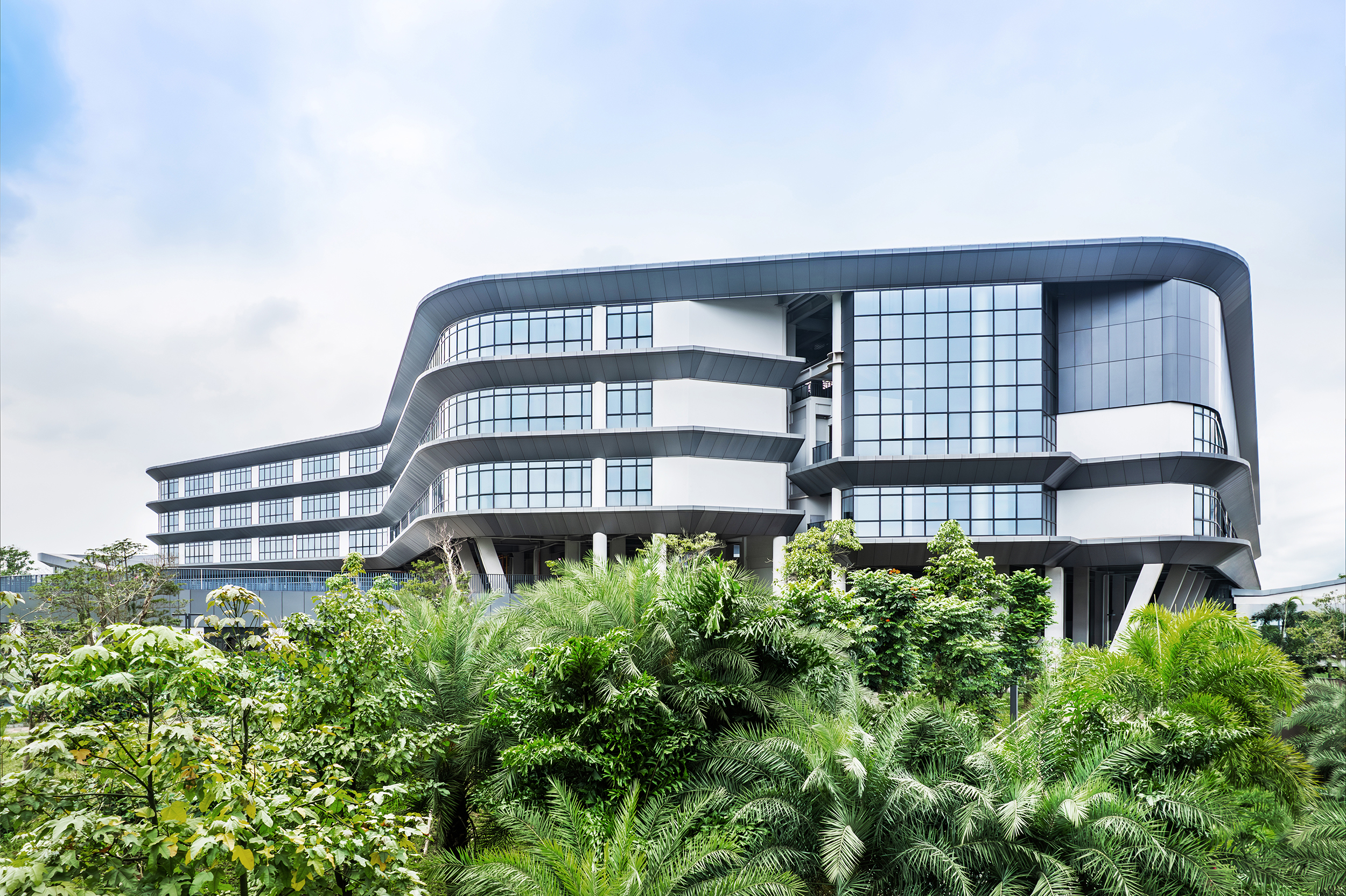
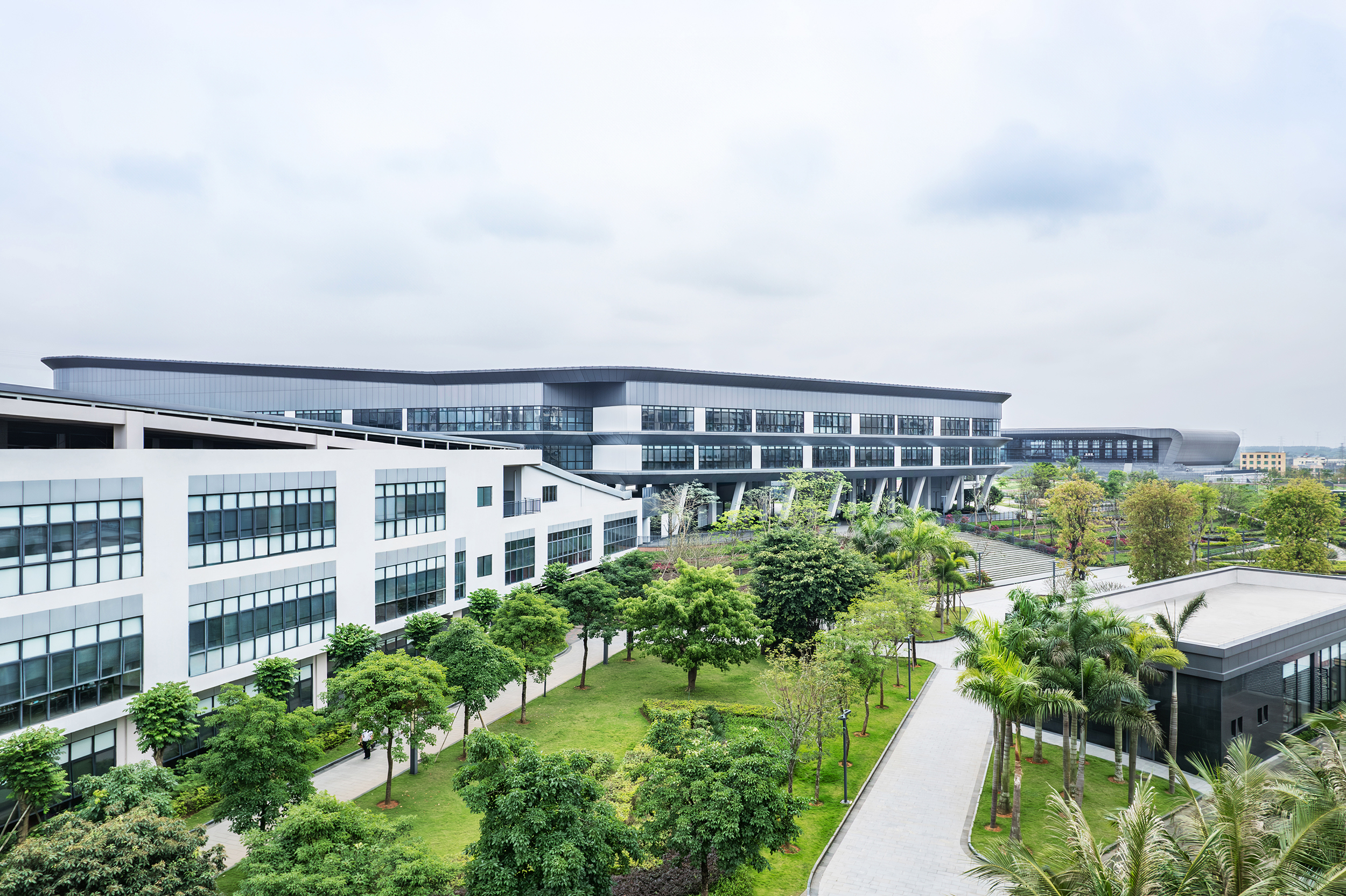
连通的学习空间
Connected Learning Spaces
动态的“S”型建筑带贯穿整个校园,有机地连接了生活、教学和体育区域。从 “云”学习中心的中点开始,建筑带向上升起,在一侧的宿舍和另一侧的体育中心达到了全高。
The dynamic S-shaped building strip weaves through the entire campus, organically connecting the living, teaching, and sports areas. From its midpoint beneath the cloud, the building strip rises, reaching its full height at the dormitory on one side and the sports center on the other.

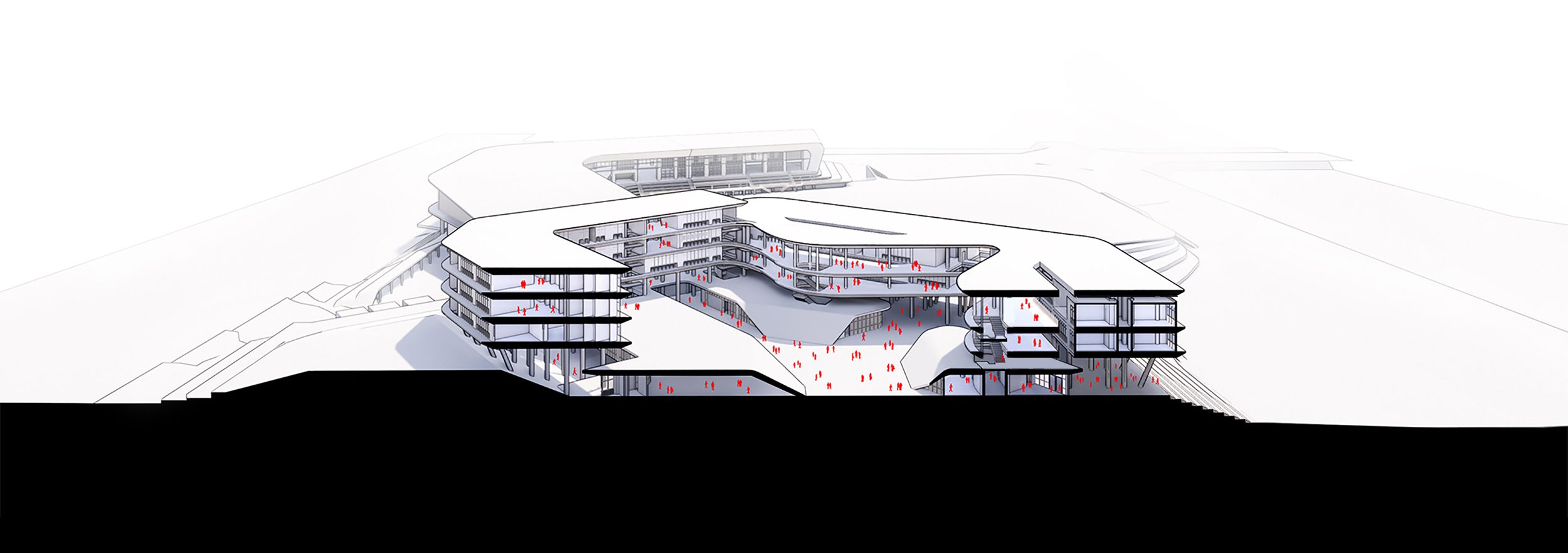
这种设计在中央漂浮的“云”中心与建筑带之间创造了统一和平衡的感觉,形成了一个波浪般的运动,完美地与场地的自然高度变化相吻合。
This design creates a sense of unity and balance with the floating cloud in the center, producing a wave-like movement that seamlessly follows the natural elevation changes of the site.
在建筑带内部,设计团队通过各种走道相互连接,创造了一个充满活力和吸引力的社交空间。学生可以自由穿梭于不同区域,进行学习交流、展示才华,并沉浸在校园文化中。设计促进了师生之间的沟通和互动,并在校园的多个点提供了通向周边自然环境的便利通道。
On the interior, the building strip is interconnected through various passageways, creating a lively and engaging social space. Students can move freely through different sections, engage in learning exchanges, showcase talents, and immerse in the campus culture. The layout of the spaces both promotes communication and interaction between teachers and students, and provides easy access to the surrounding natural environment at various points throughout the campus.
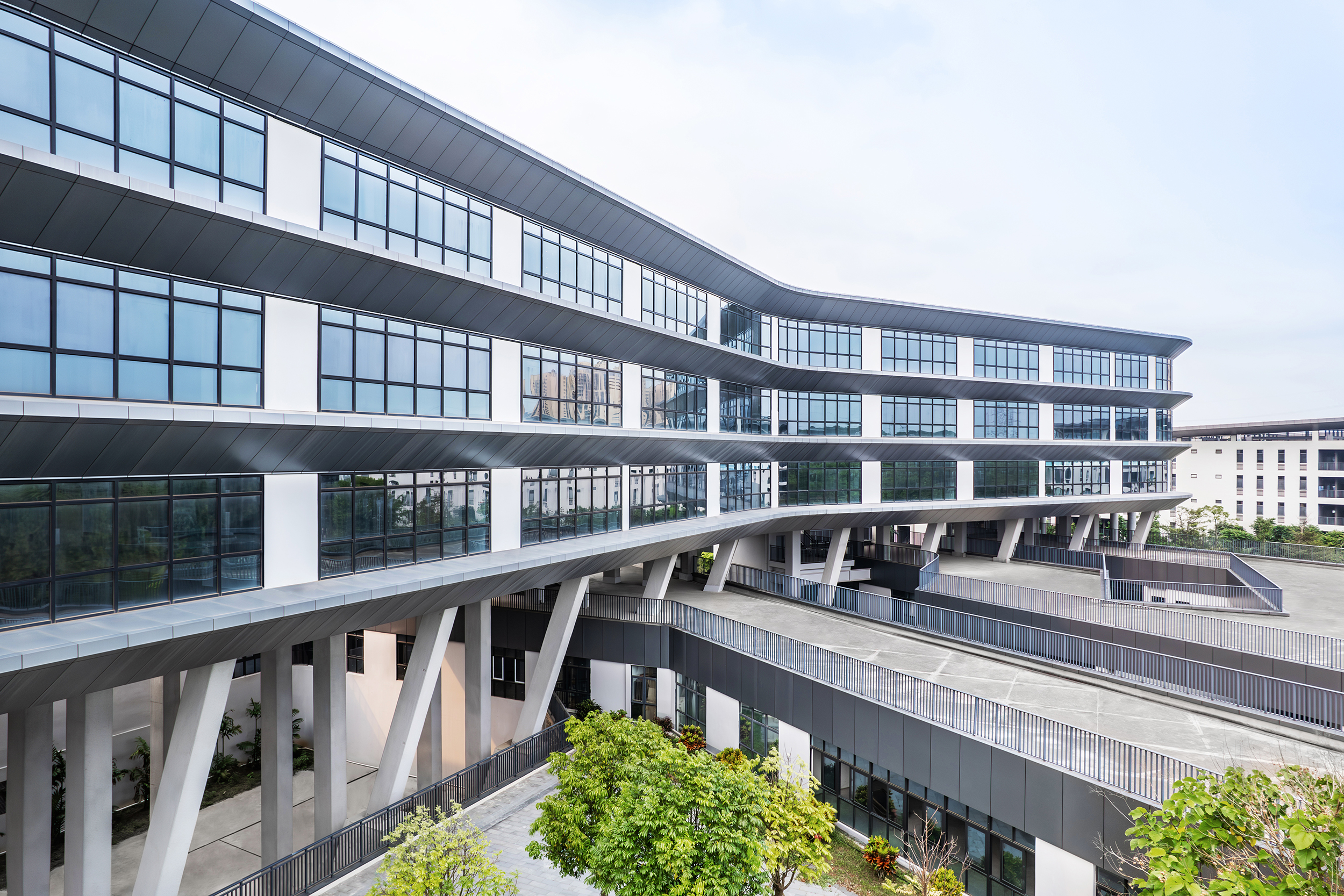
超越课堂的学习延伸
Extending Learning Beyond the Classroom
在海口学校,每一个空间都被设计为潜在的学习环境,营造出一个丰富、多样和开放的氛围,超越传统的课堂。无论是在食堂、公共区域还是户外空间,学生都被鼓励去探索、合作和成长。
At the Haikou Campus, every space is designed to be a potential learning environment, fostering a rich, diverse, and open atmosphere that goes beyond the traditional classroom. Whether in the canteen, common areas, or outdoor spaces, students are encouraged to explore, collaborate, and grow.
设计团队的联合创始人及合伙人Binke Lenhardt解释道:“学习不应止步于教室的门口——校园的每一个空间都有可能成为学习环境。”
As Binke Lenhardt, co-founder and partner of Crossboundaries, explains: “Learning should never stop at the classroom door—every space on campus has the potential to be a learning environment.”

“云”学习中心通过其教室之间的休息区和延伸到户外的走廊区域,将这一理念付诸实践。无论是学习、辅导、社交,还是独立学习,学生都拥有无尽的机会与他人互动,也可以通过笔记本电脑和其他设备随时随地进行学习。
The cloud learning center brings this philosophy to life by extending learning beyond traditional classes with its breakout spaces between classrooms and circulation areas. Whether studying, tutoring, socializing, or engaging in independent learning, students have endless opportunities to connect, also via laptops and other devices, empowering them to learn anytime, anywhere.
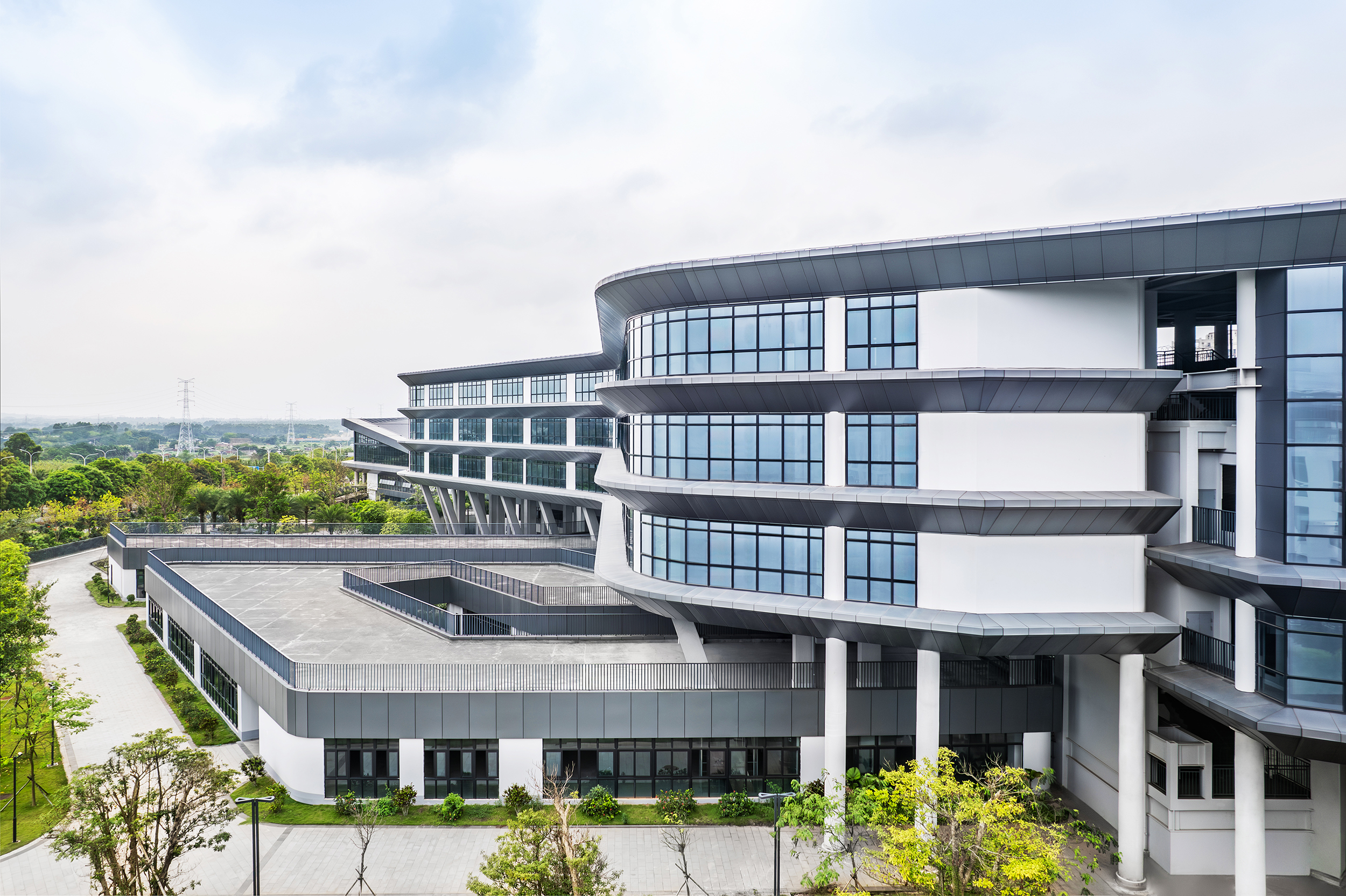

校园的三大核心组成部分
Three Key Components of the Campus
海口学校在视觉上由三大核心元素统一:宿舍综合体、体育活动综合体和云形学习中心。
The Haikou Campus is visually unified by three main elements: the dormitory complex, the sports and activity complex, and the cloud learning center.
校园中心的“学习云”由45组钢柱支撑,容纳了初中部和高中部的教室。云形设计采用流线型轮廓,悬浮于其他建筑之上。
At the center of the campus lies the “Learning Cloud,” supported by 45 steel columns and housing classrooms for both junior and senior high students. The cloud-inspired design features a streamlined outline that hovers above the rest of the buildings.
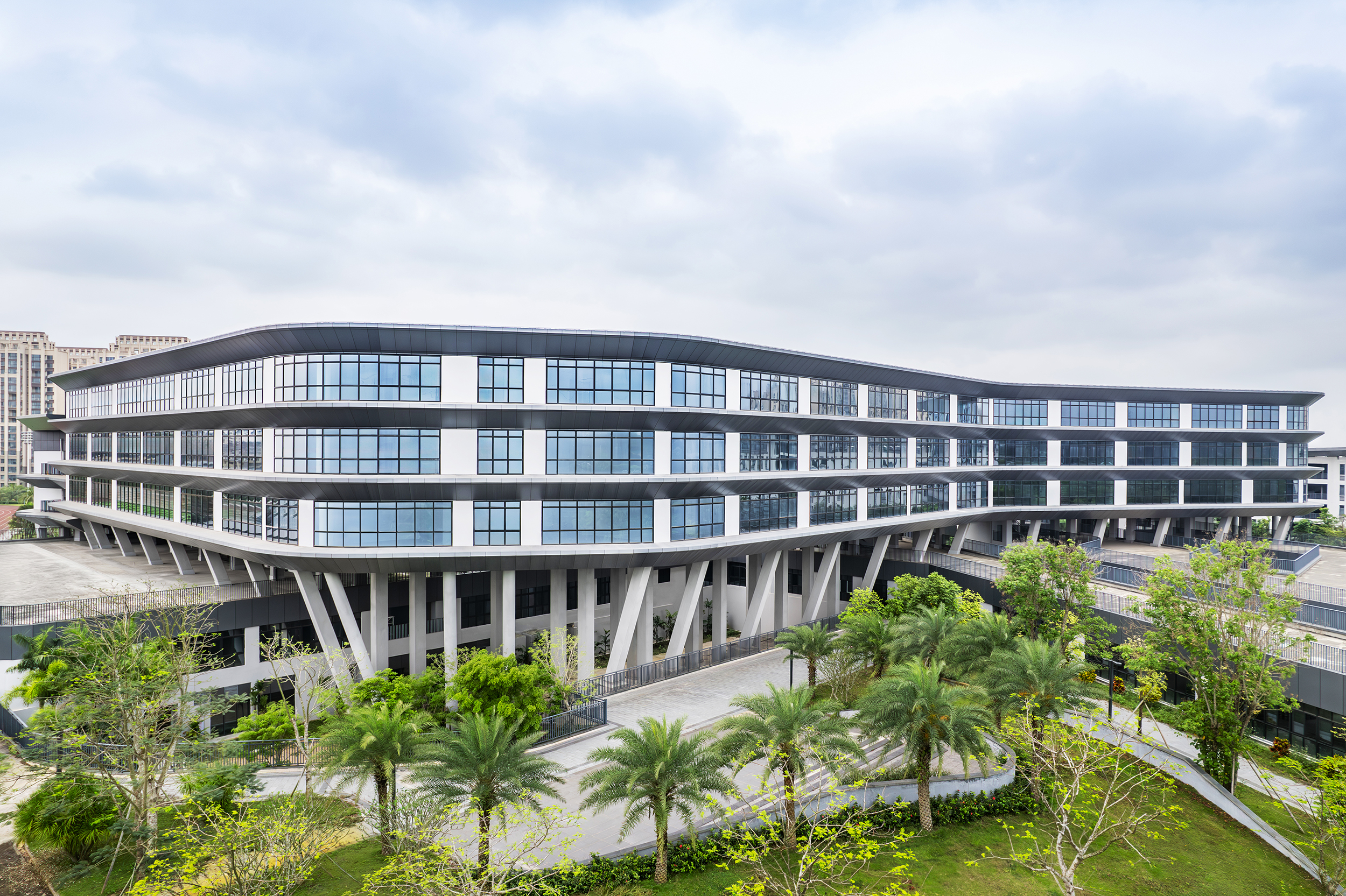
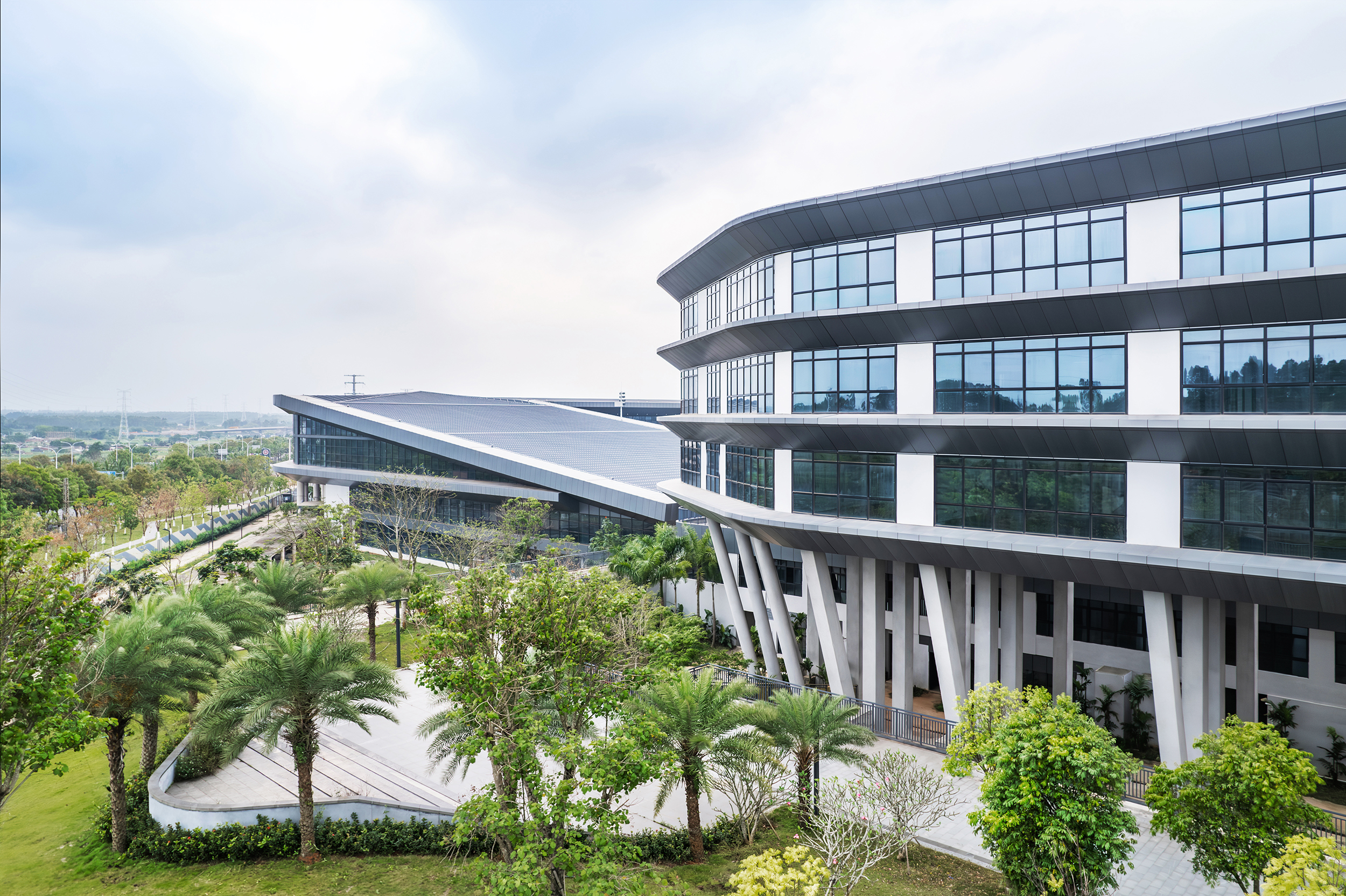
它是一个互动学习中心,拥有各种类型的空间,激发不同的学习模式和师生互动。在主要教室下方,你会发现整合的教学区域、图书馆、实验室、创客空间和多媒体教室,所有这些都旨在满足现代教育的需求。
The space serves as a hub of interactive learning, with various types of spaces that inspire different learning modes and teacher-student interactions. Beneath the main classrooms, you’ll find integrated teaching areas, libraries, laboratories, maker spaces, and multimedia rooms, all designed to meet the needs of modern education.

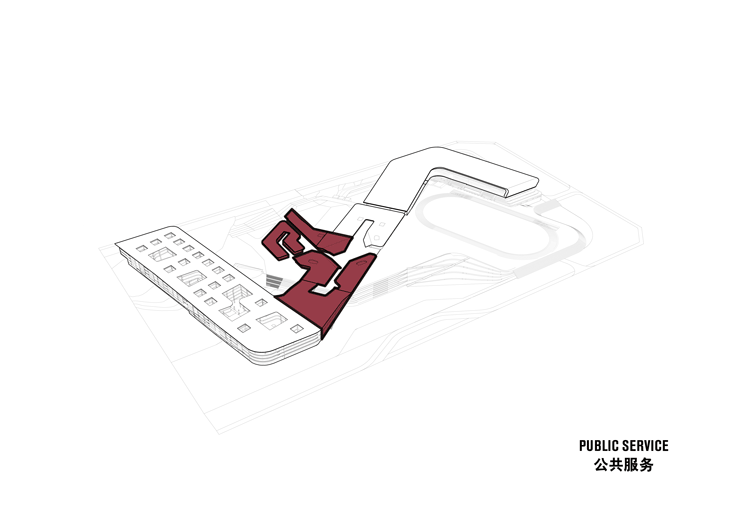
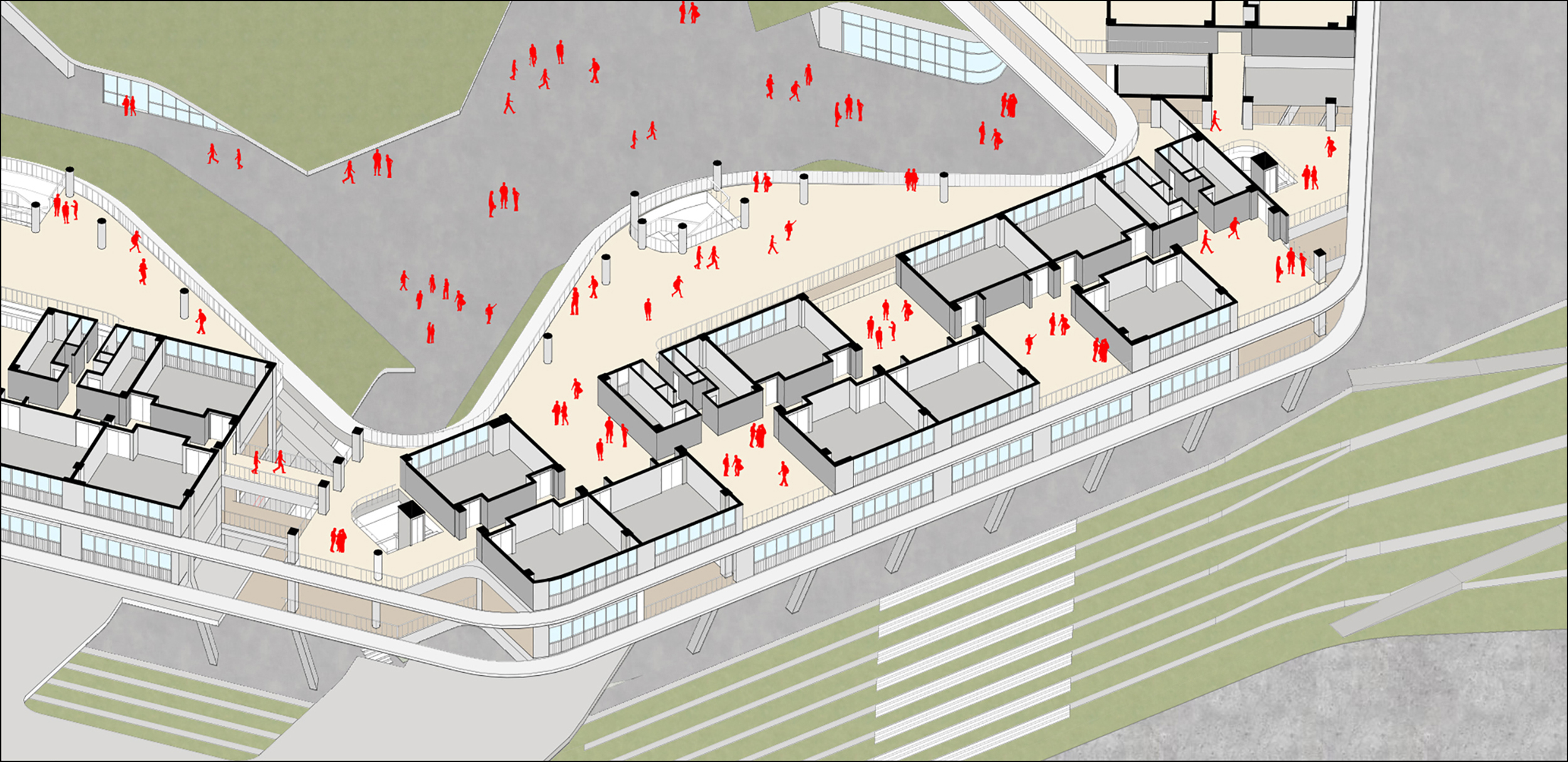
设计团队的联合创始人及合伙人董灏强调了这一空间的影响:“这个学习空间能够激励并引导学生发展和实现他们的目标——一个积极尝试以最佳方式促进这一过程的空间。”
Hao Dong, co-founder and partner of Crossboundaries, highlights the impact of this space: “This learning space is enouraging and influencing students to develop and achieve their goals—a space that proactively tries to facilitate this process in the best possible way.”
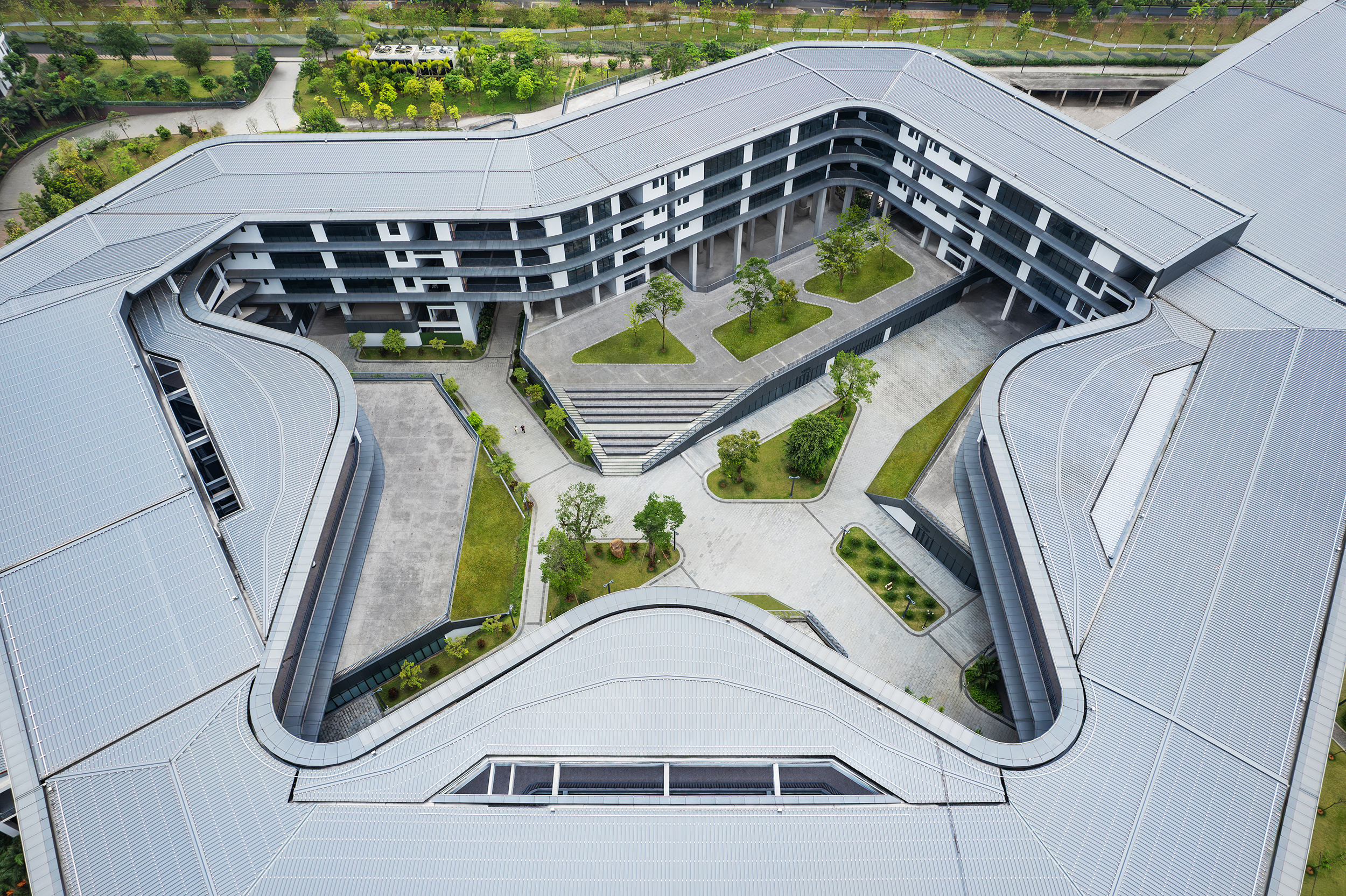
学校东侧的宿舍综合体独具特点,功能多样,包括学习室、学生和教职工宿舍、餐厅和活动空间。该综合体由四个相互连接的单元组成,每个单元的高度不同,从北向南逐渐下降。设计中包括大小的庭院,以增强通风和自然采光,并采用倾斜屋顶,引导夏季微风,确保舒适的生活环境。
The dormitory complex on the campus’s eastern side has its own distinct character, with a mix of functions including study rooms, dormitories, for both students and faculty, dining halls, and activity spaces. The complex consists of four interconnected units, each with a different height, stepping down from north to south. The design includes large and small courtyards to enhance ventilation and natural light, with slanted roofs that channel summer breezes, ensuring a comfortable living environment.
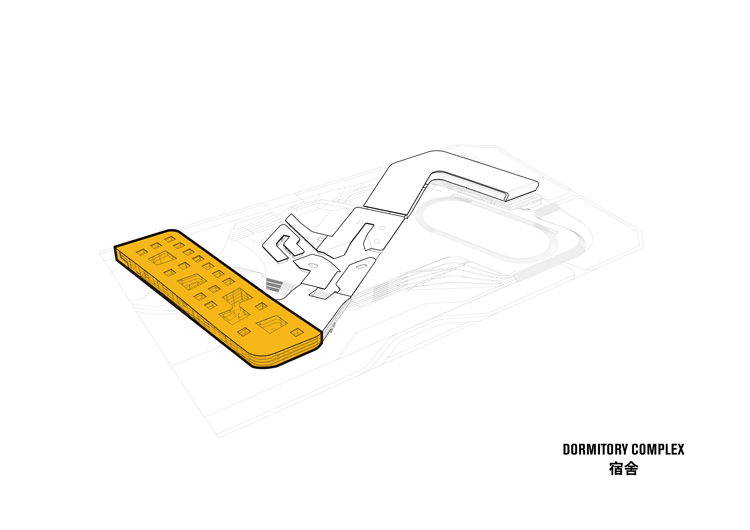
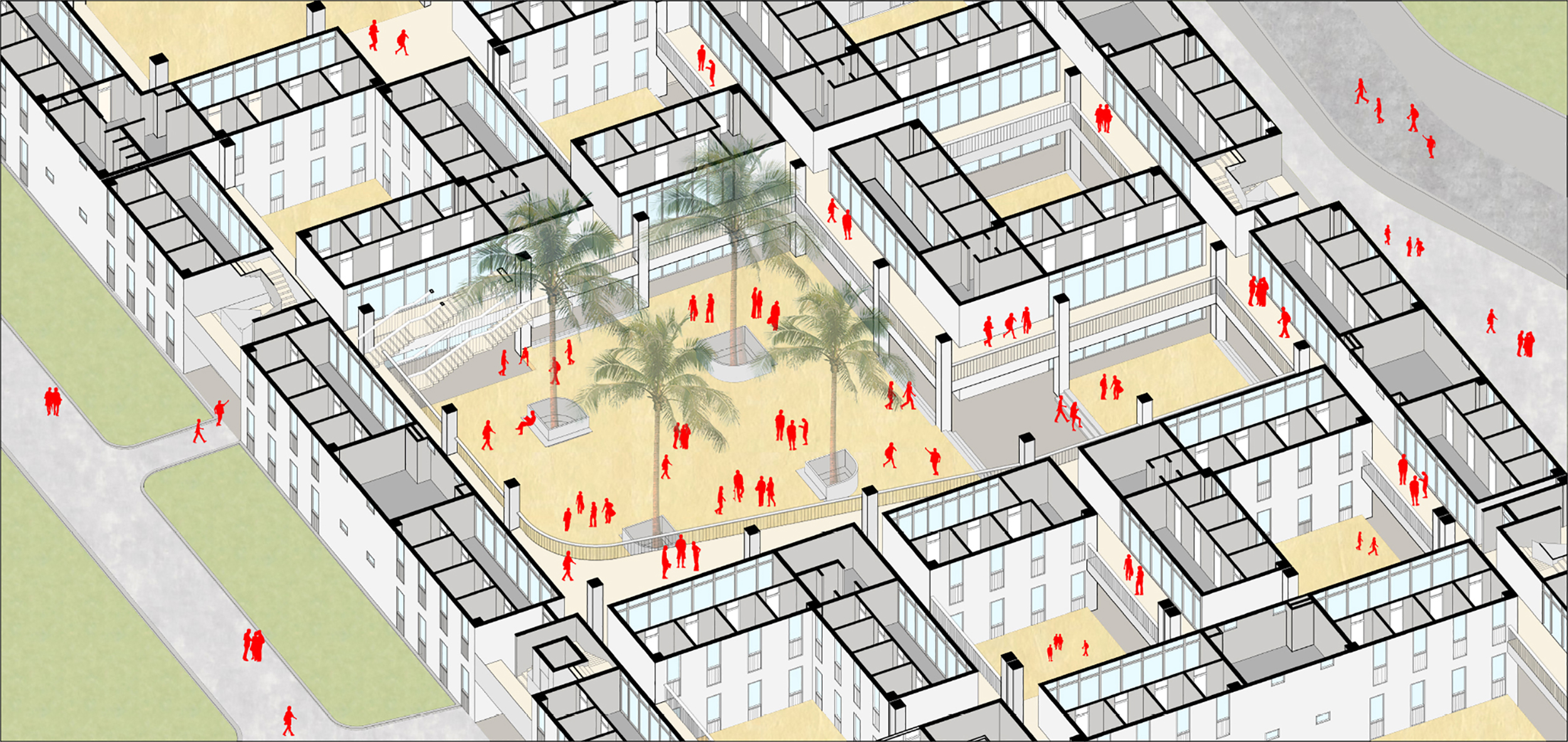
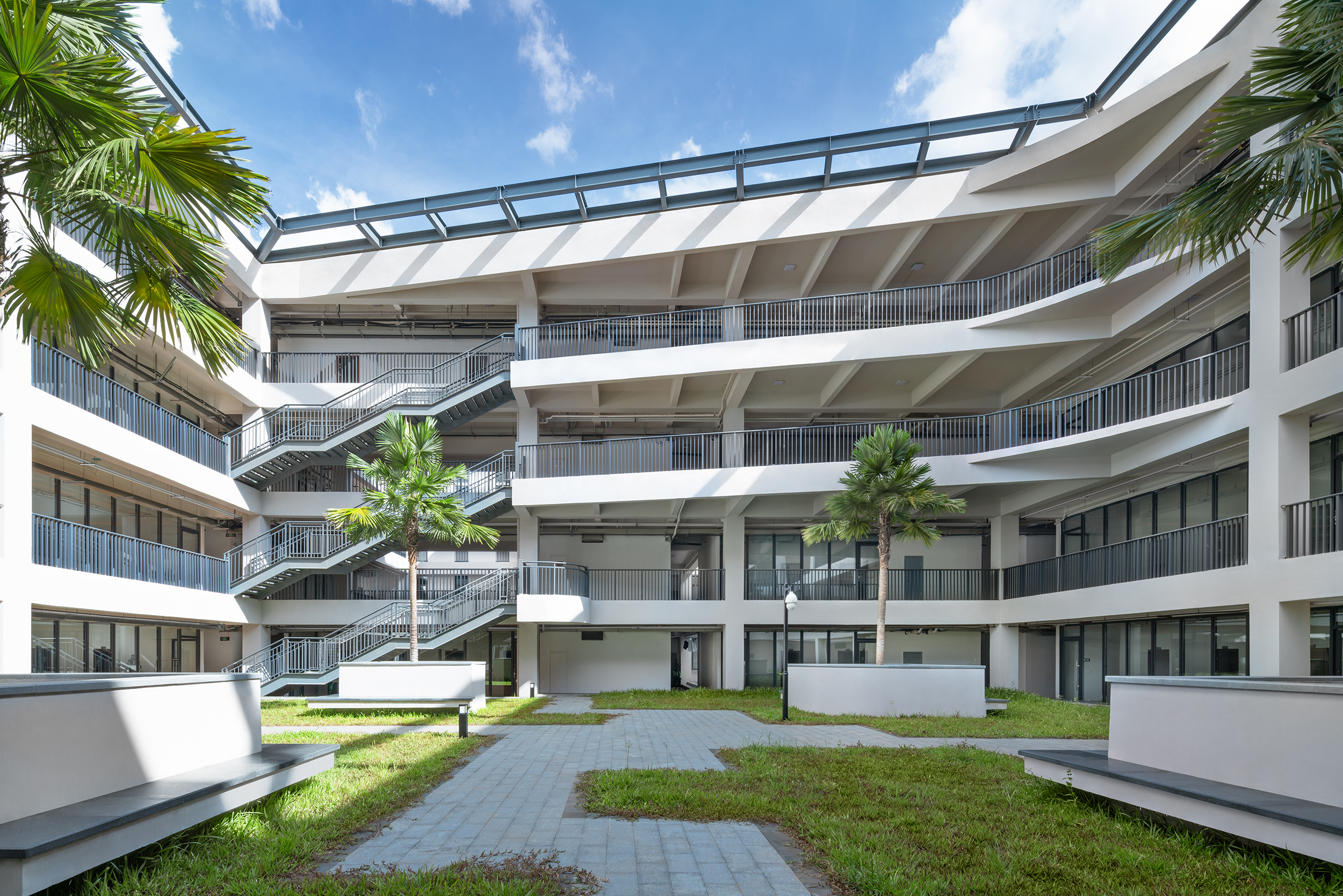
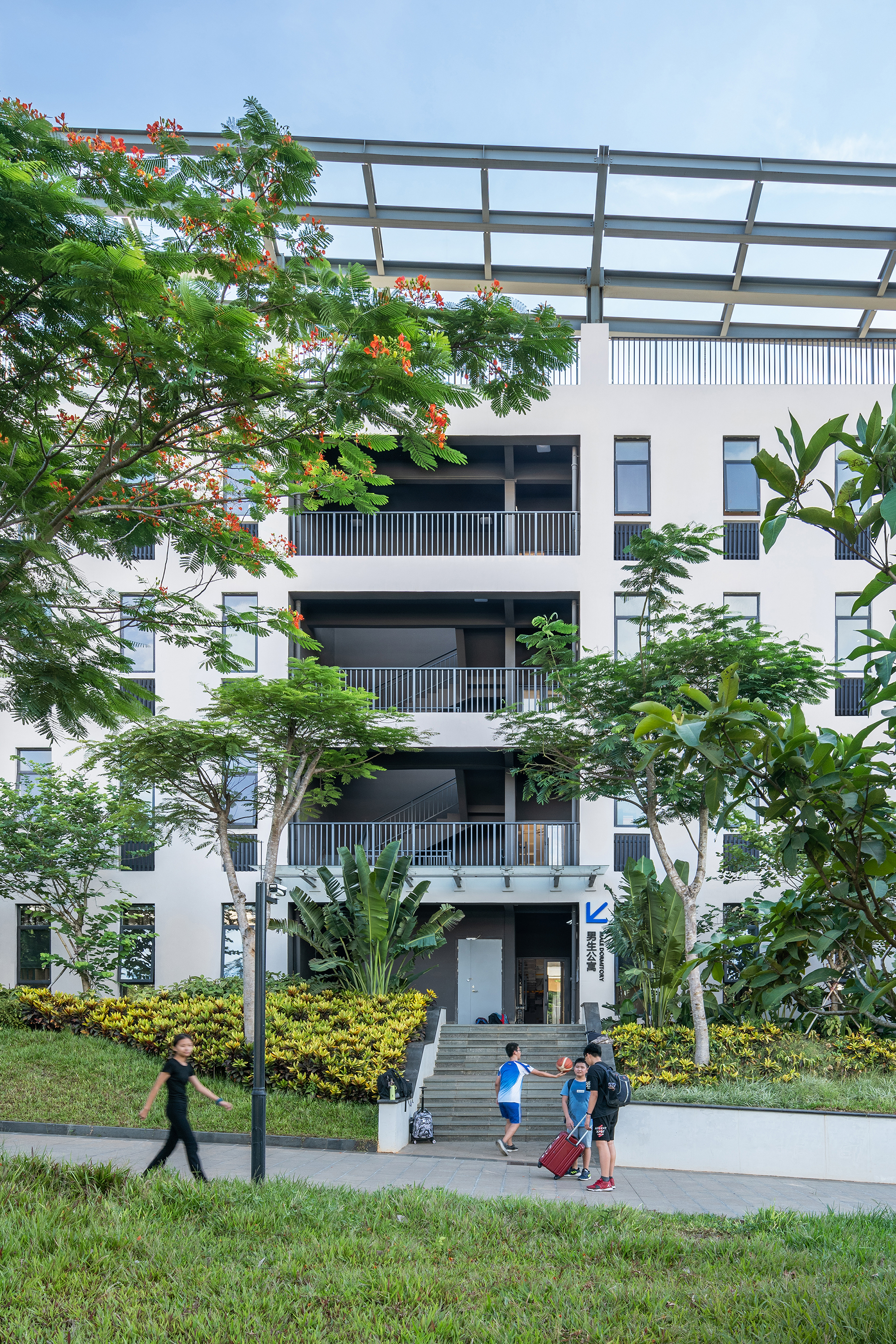
在校园的西侧,设置有专门用于艺术和体育活动的室内外运动设施。体育中心需要较大的高度,分为两层,设施包括篮球馆、羽毛球场和一个50米游泳池。其他配套设施,如更衣室和淋浴室,则位于夹层。室外运动区略高,下面设有停车场。
On the western side, the campus is dedicated to the arts and sports, featuring both indoor and outdoor sports facilities. The sports center requires significant height and is split into two floors, containing amenities like basketball hall, badminton courts, and a 50-meter swimming pool. Supporting areas, including changing rooms and showers, are conveniently located on a mezzanine level. The outdoor sports area is elevated, with parking provided below.
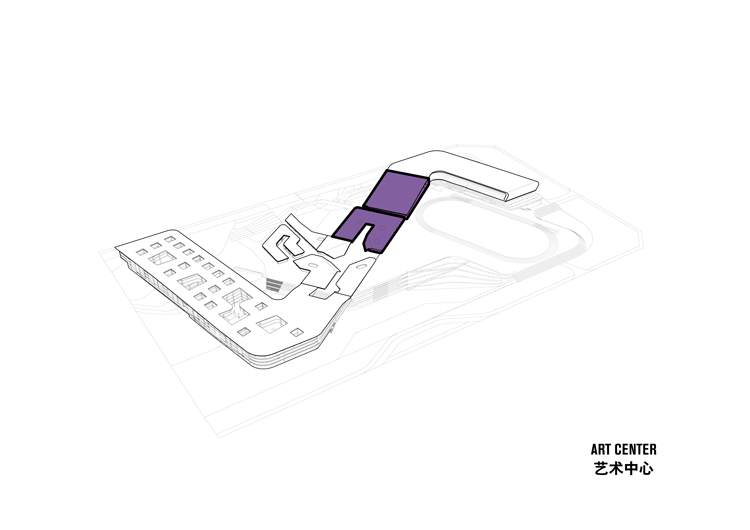
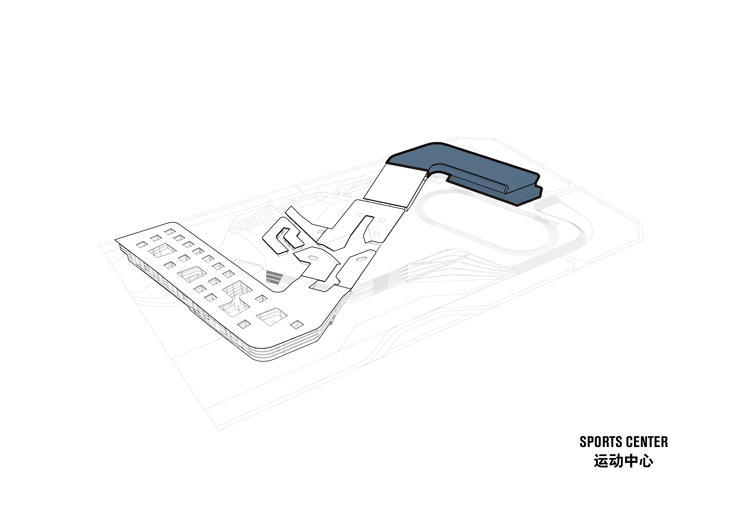
体育和艺术中心与校园其他部分一样,设计时充分考虑了现有场地条件。运动场的跑道环绕其中,与体育中心的体量无缝融合,而北侧下面隐藏的停车区则方便车辆从公共街道进入。
The sports and arts center, like the rest of the campus, is carefully integrated with the existing landscape. The sports field with running tracks surrounding it, blends seamlessly with the volume of the sports center, while the parking area, tucked below offers convenient access from the public street in the north.

引领教育创新的道路
Leading the Way in Educational Innovation
海口学校的设计充分反映了现代教育理念和教学模式的要求,特别是在应对AI时代的需求。其动态的“S”型建筑带以及漂浮的云形学习中心,打破了传统学校布局的僵化,提供了一个开放、灵活、创新的环境,促进了健康的学习和生活。
The design of the Haikou Campus fully reflects the requirements of modern educational concepts and teaching models, particularly in addressing the needs of the AI era. Its dynamic S-shaped building strip, featuring the floating Cloud Learning Center, moves beyond the rigidity of traditional school layouts, offering an open, flexible, and innovative environment that promotes healthy learning and living.
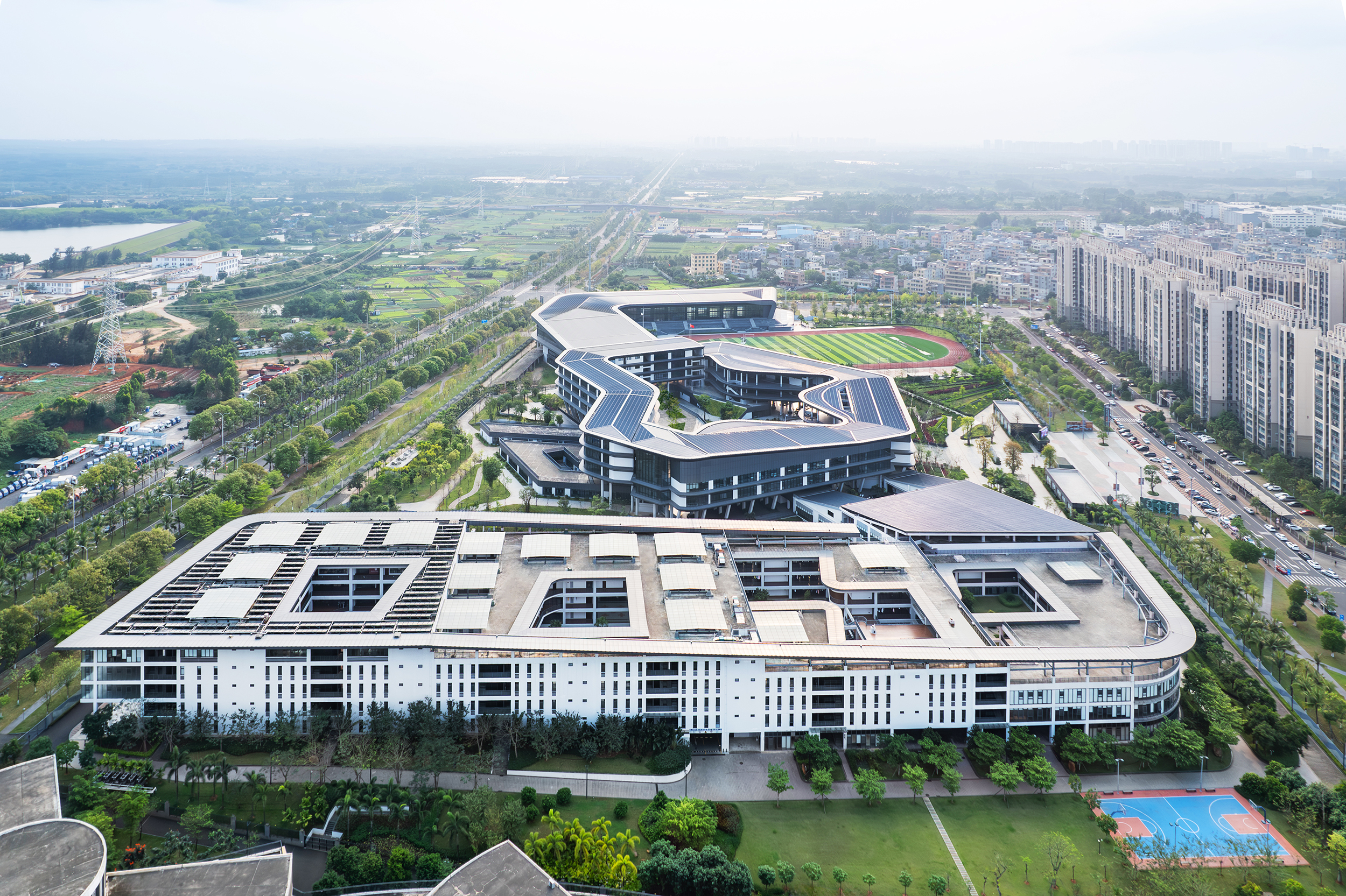
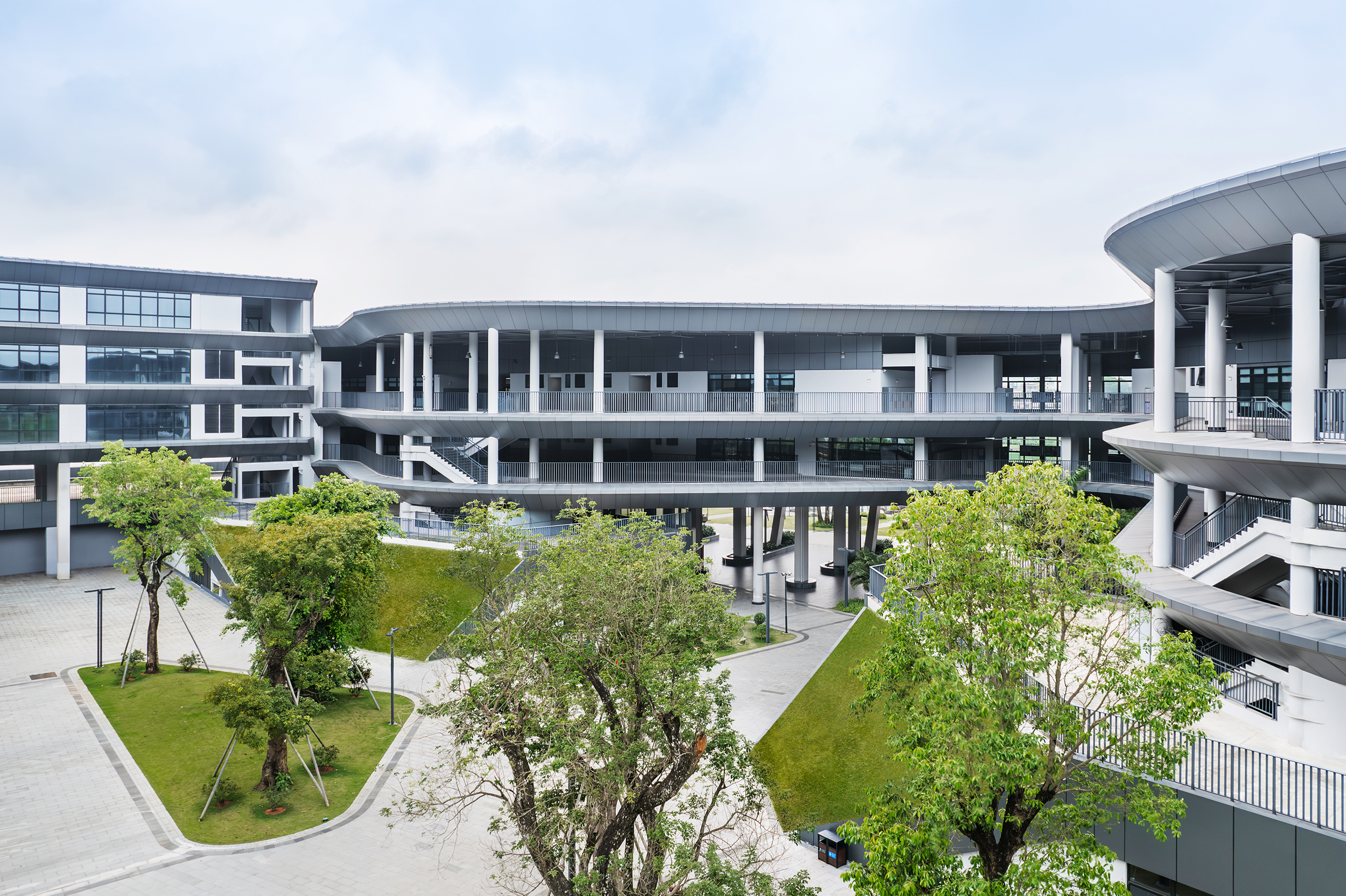

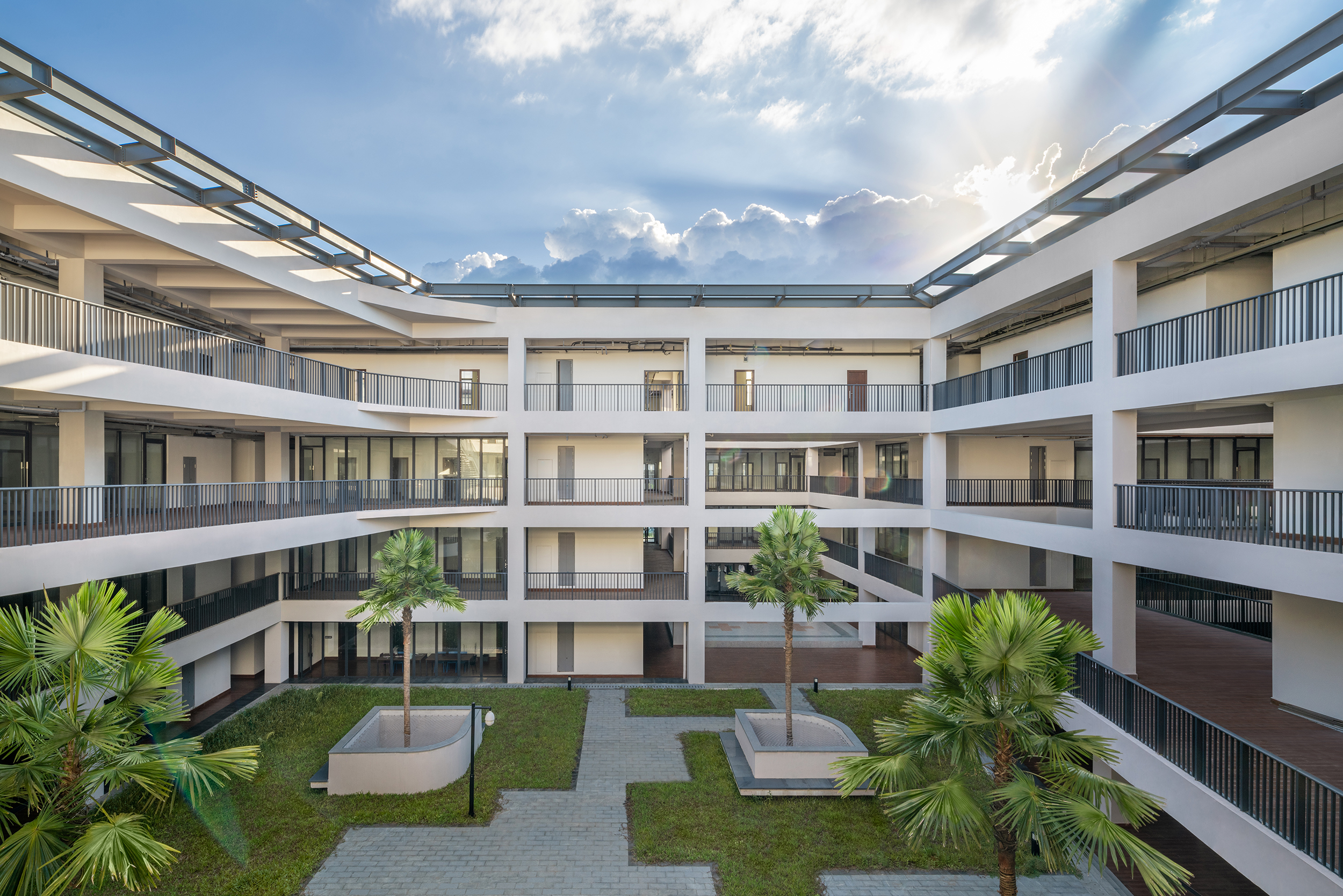
学校积极融入AI等新技术,实现了个性化和智能化的教学管理和服务,从而提高了教学效果和学习质量。北京大学附属中学海口学校的建设成为了海南省乃至全国教育发展和创新的宝贵典范。
The school embraces new technologies like artificial intelligence, realizing personalized and intelligent teaching management and services that improve teaching effectiveness and learning quality. The construction of the Peking University Affiliated High School in Haikou serves as a valuable model for educational development and innovation in Hainan Province and across the country.
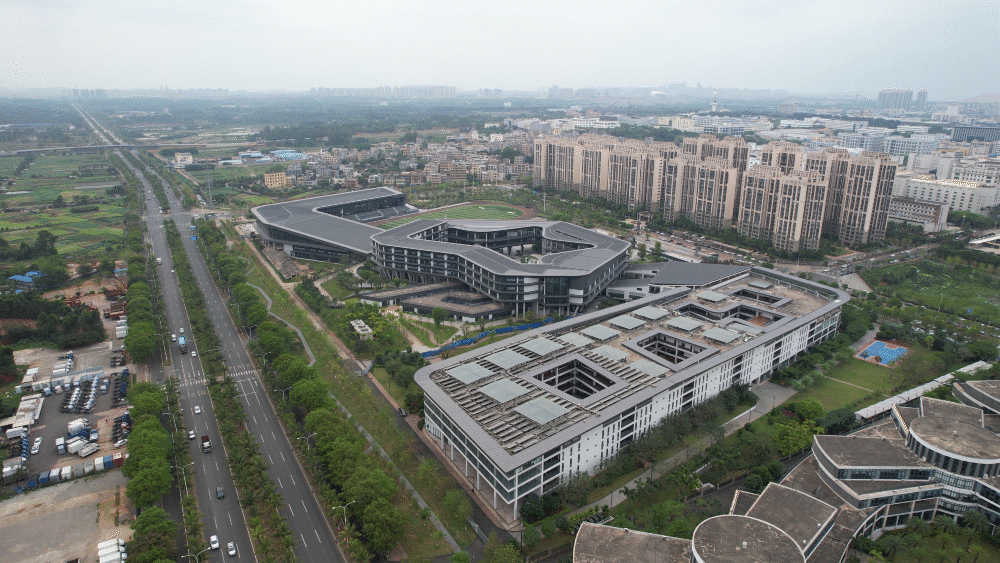
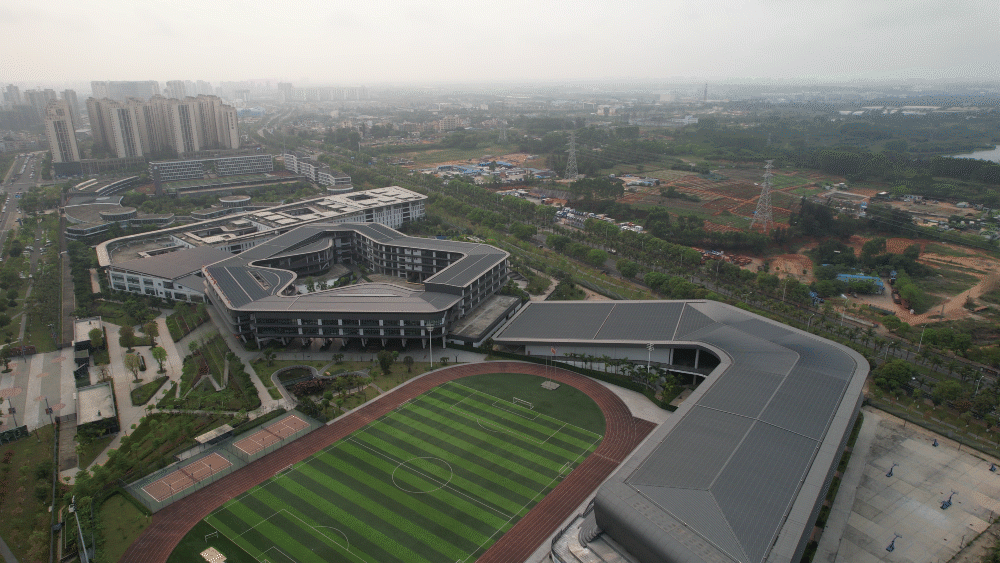
设计图纸 ▽
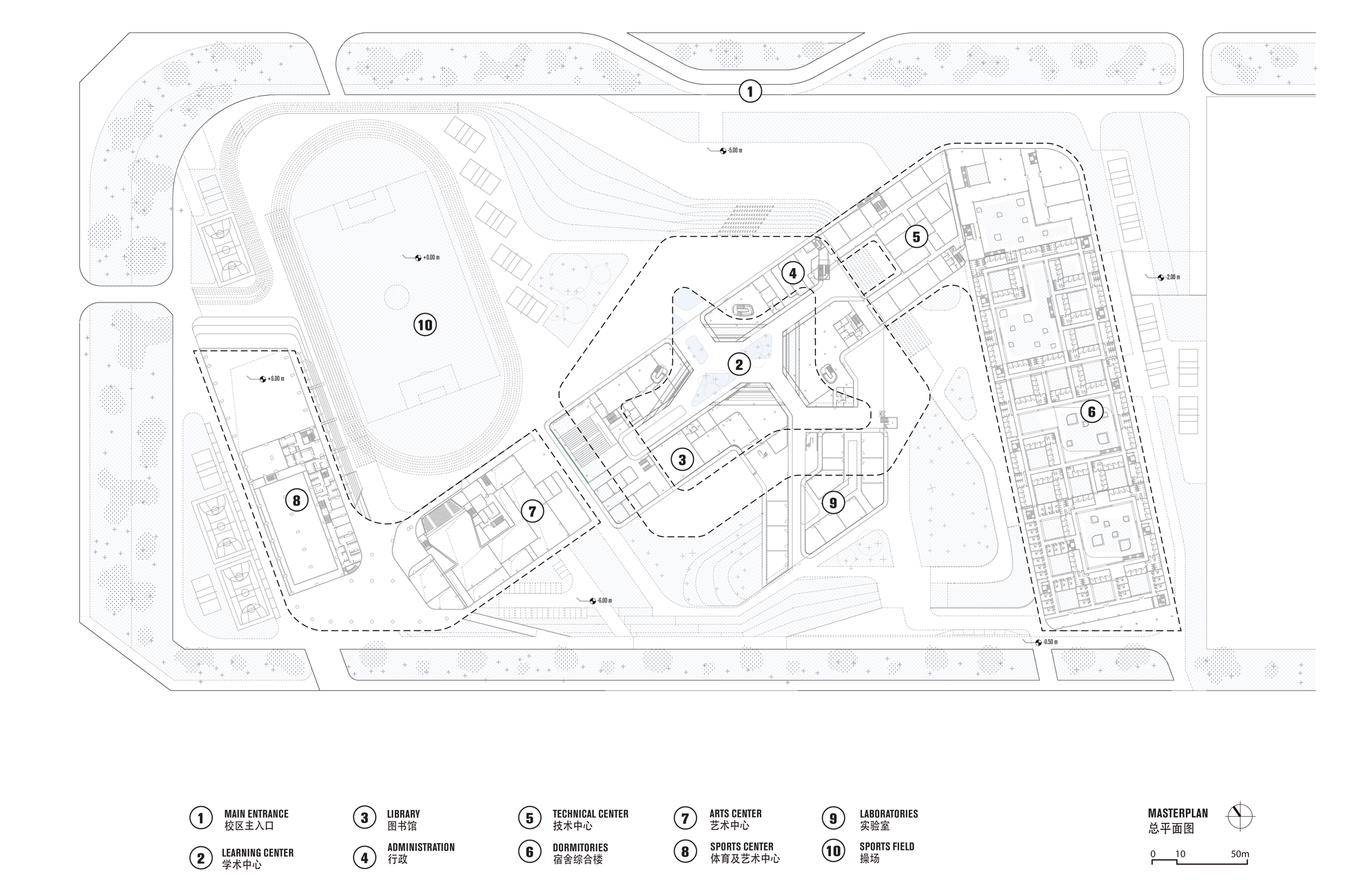

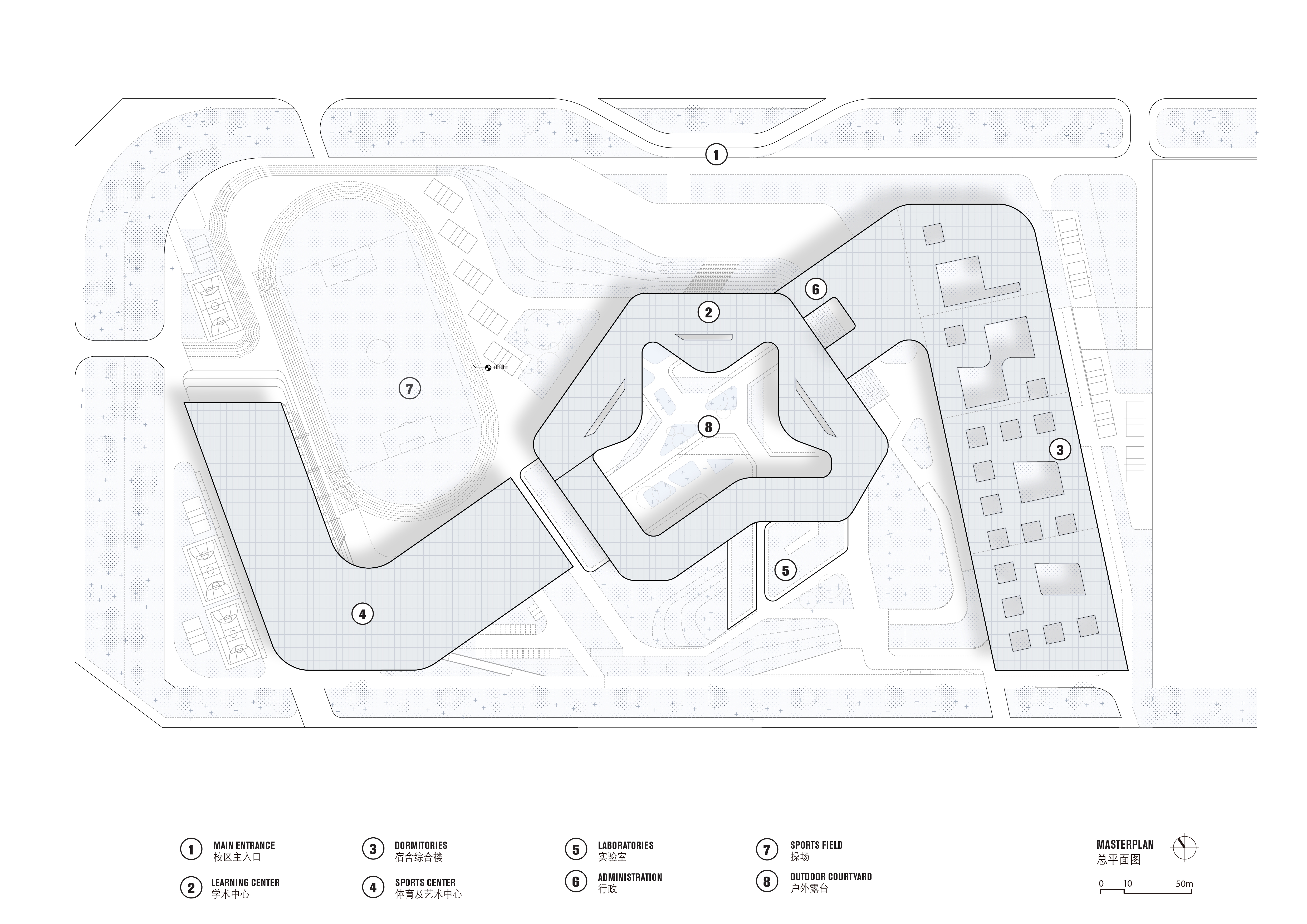
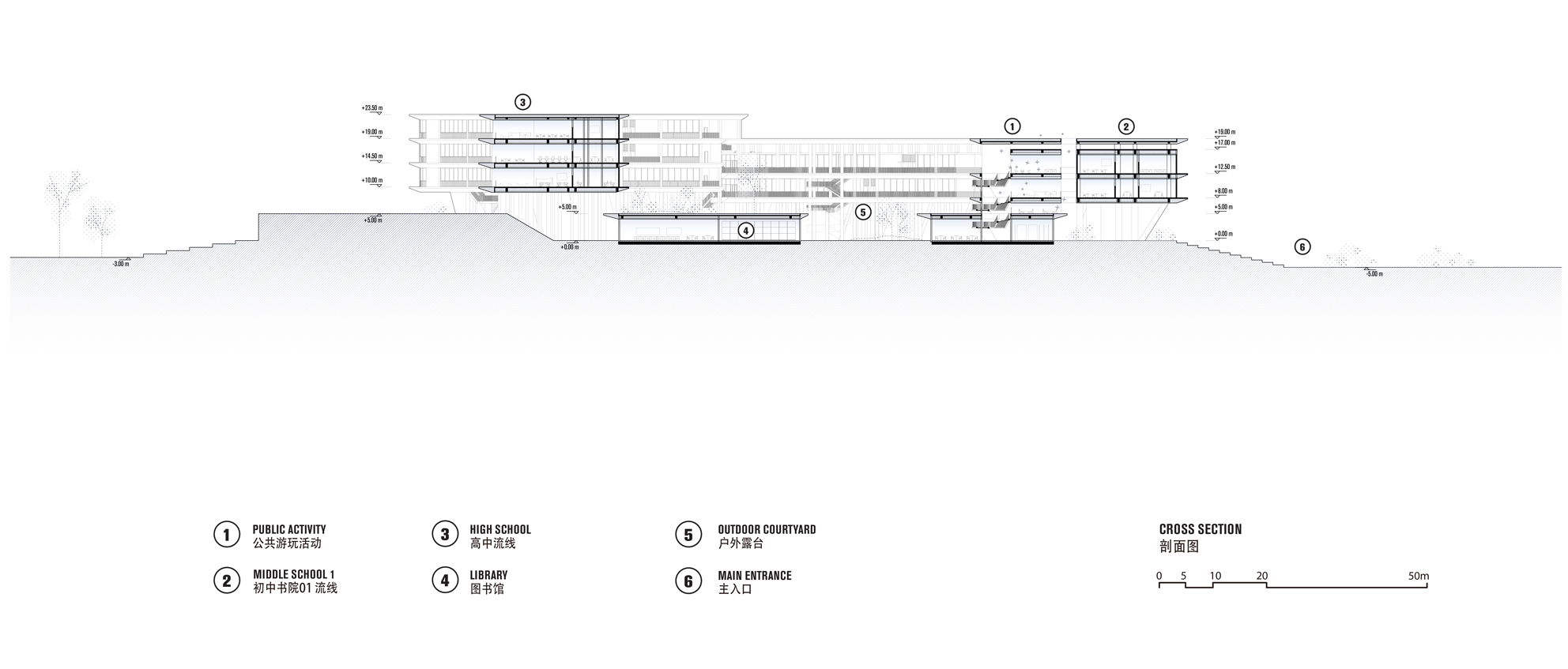
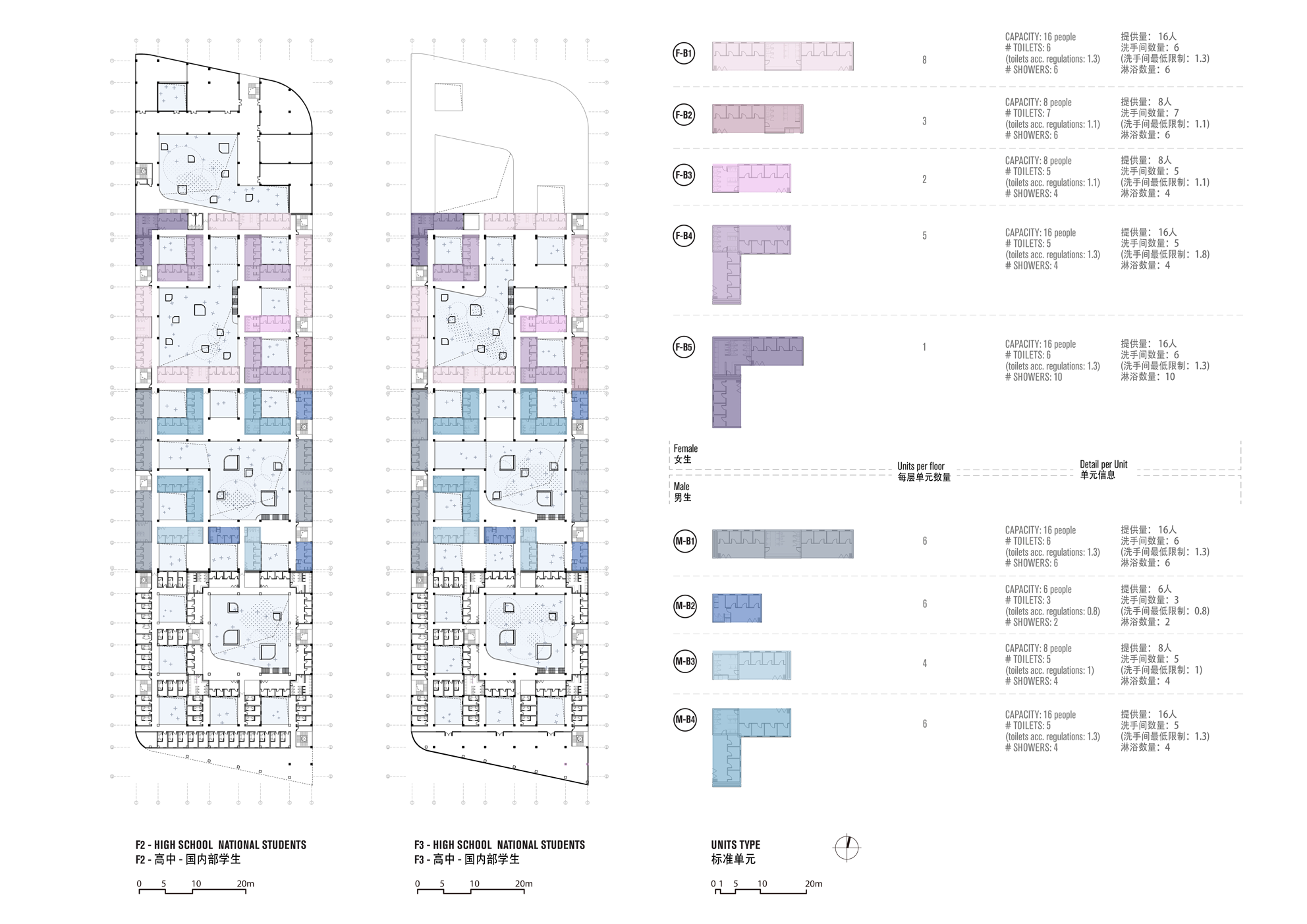

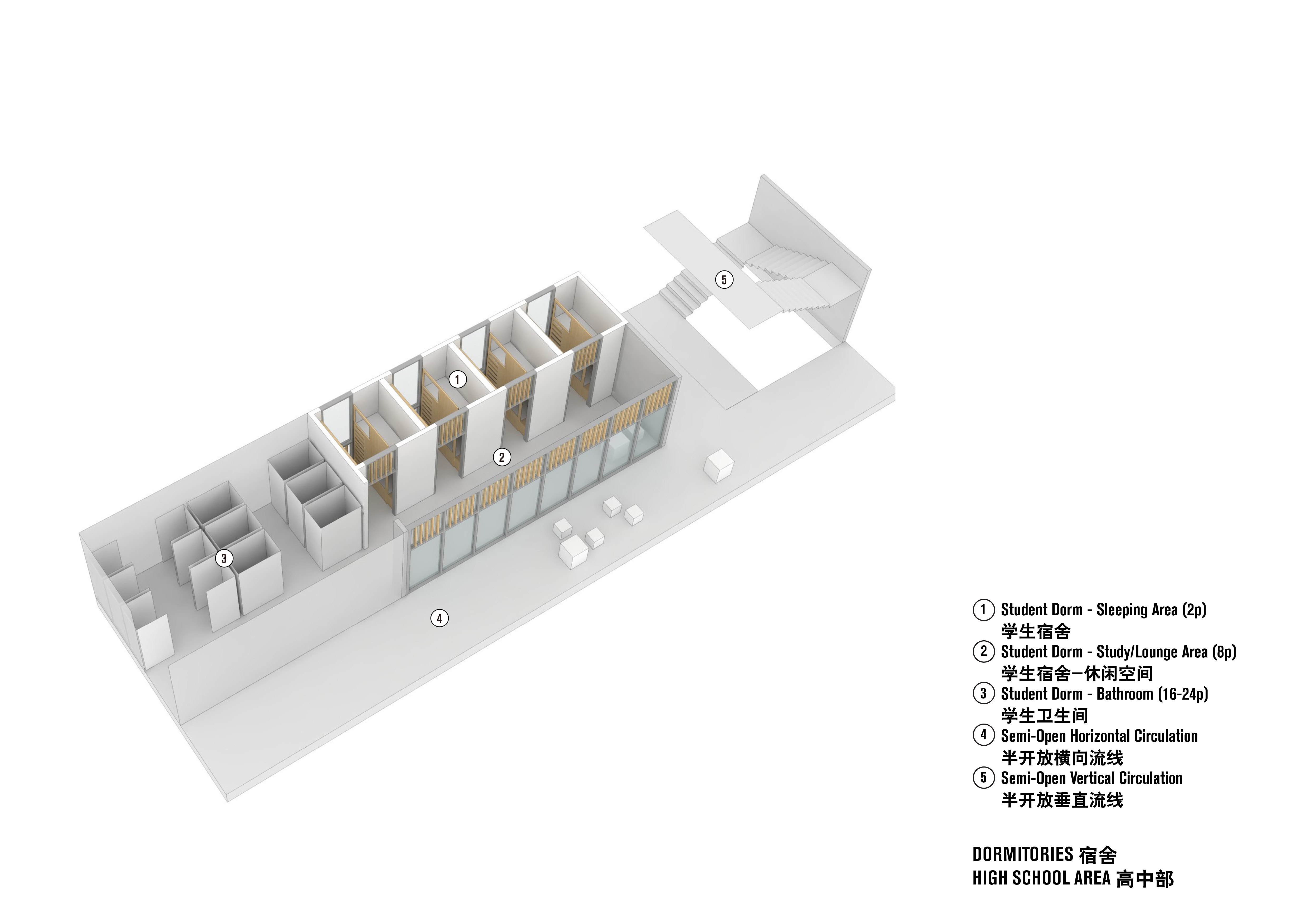
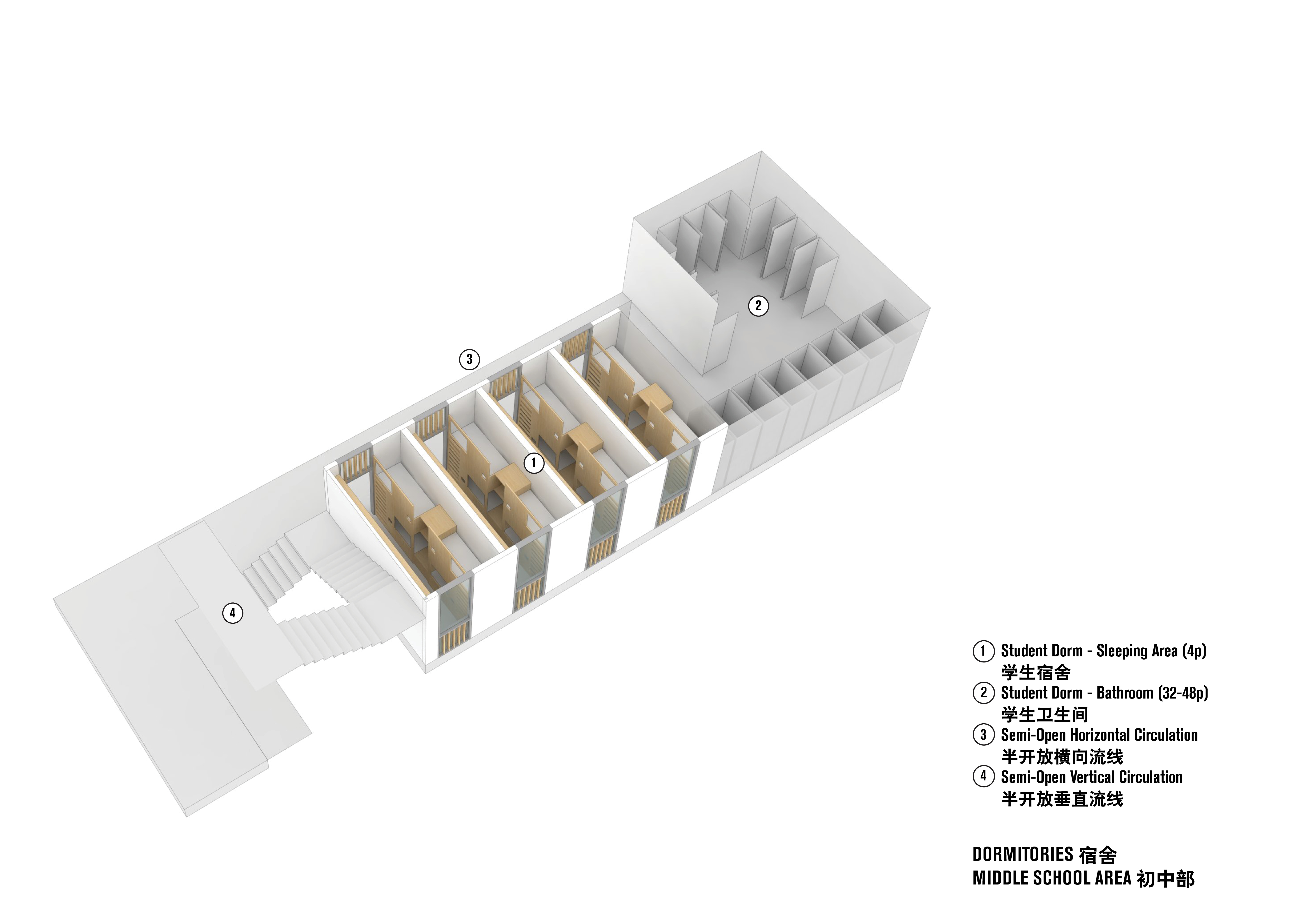

完整项目信息
项目名称:北京大学附属中学海口学校
地点:中国海南省海口市
业主:北京大学附属中学
校园面积:133,340平方米
建筑占地面积:32,750平方米
总建筑面积:138,095平方米(地上106672 平方米,地下31423平方米)
容积率:0.8
学生人数:3600人,初中1500人,高中2100人
设计时间:2019年9月-2020年4月
建设阶段:2019年12月-2024年1月全部建成
竣工时间:2024年1月(全面开始运营)
建筑师:Crossboundaries,北京,中国
项目负责人:Binke Lenhardt(蓝冰可),董灏
设计团队:Libny Pacheco, Sidonie Kade, Tracey Loontjens, 崔雨柔, 汤佳音, 甘力, 郝洪漪, 于兆雄, Silvia Campi, 王旭东
合作方:DGN Design Studio, 海南华磊建筑设计咨询有限公司
摄影/摄像:白羽
视频制作:Elena Gamez Miguelez
版权声明:本文由Crossboundaries授权发布。欢迎转发,禁止以有方编辑版本转载。
投稿邮箱:media@archiposition.com
上一篇:北京大学附属中学海口学校|Crossboundaries
下一篇:深圳坪山长守村“软广场”建筑装置 / 朱小地建筑设计事务所(北京)有限公司